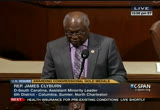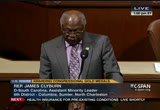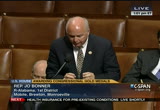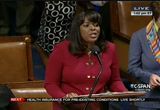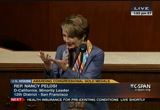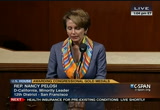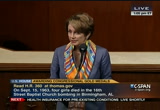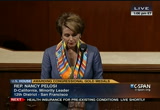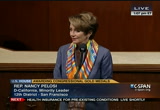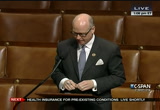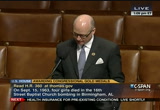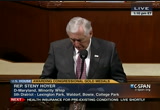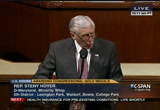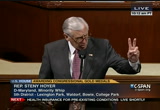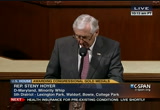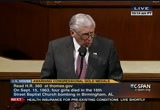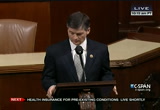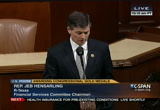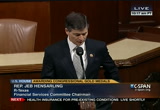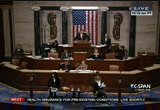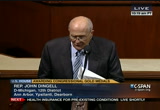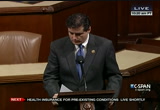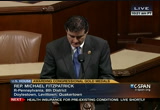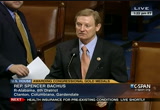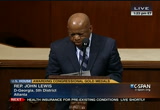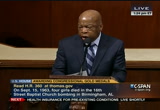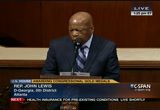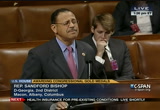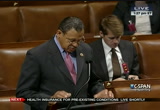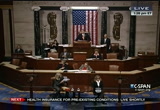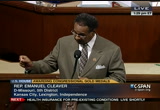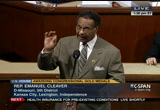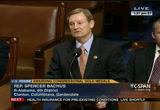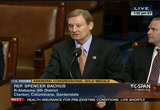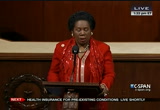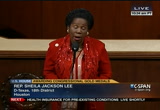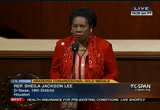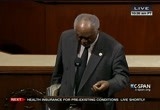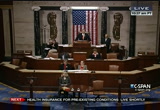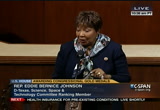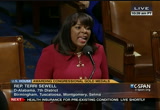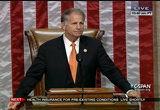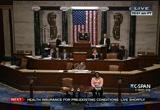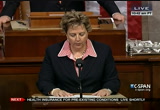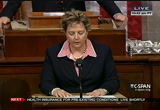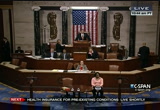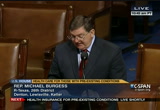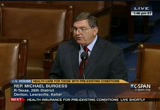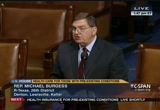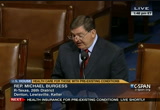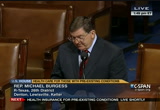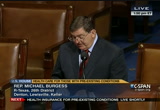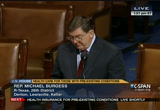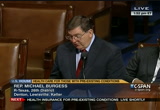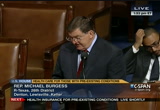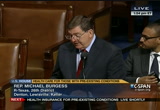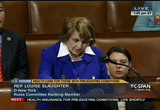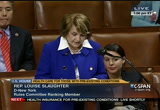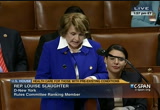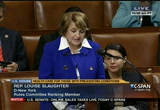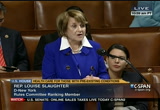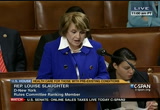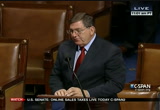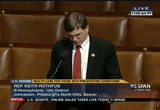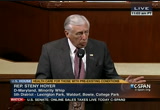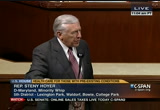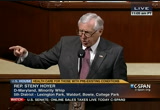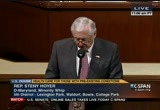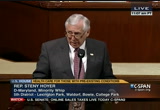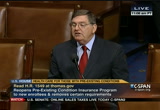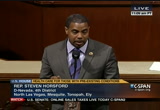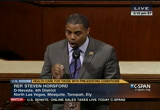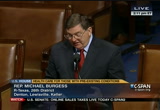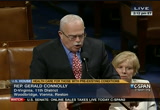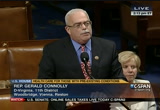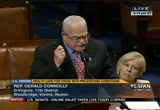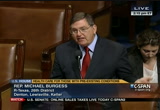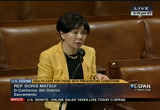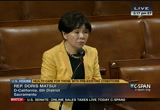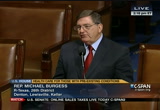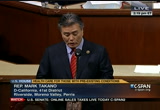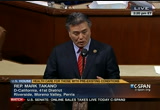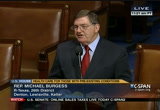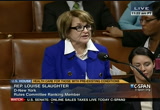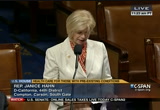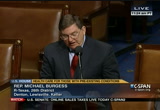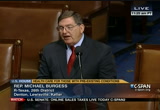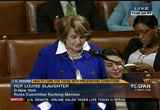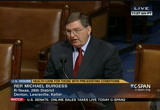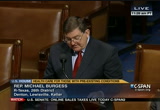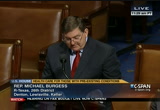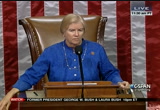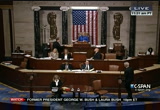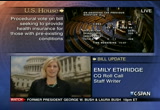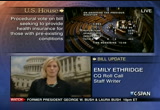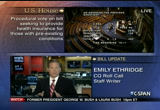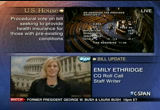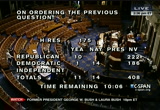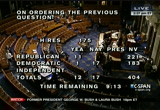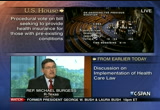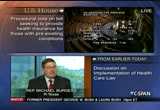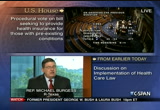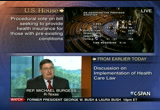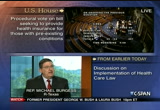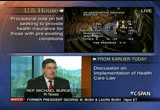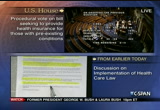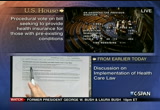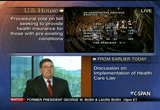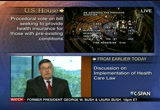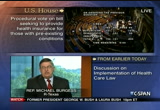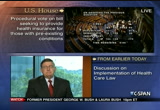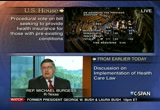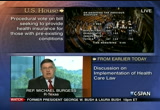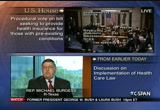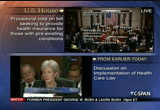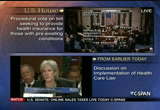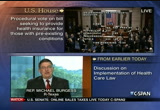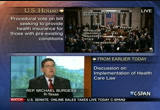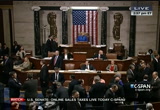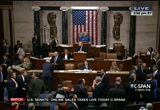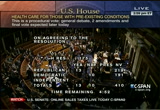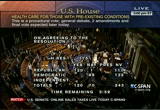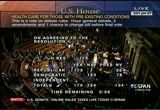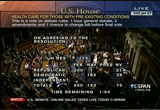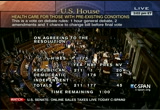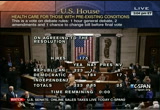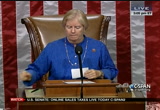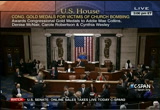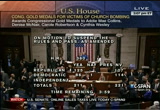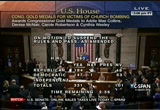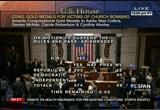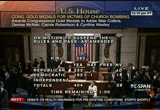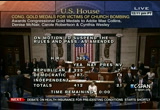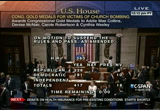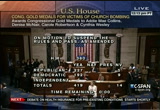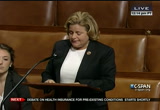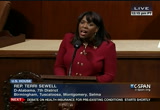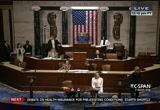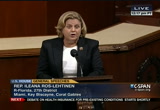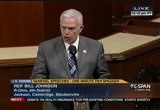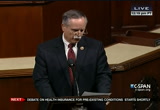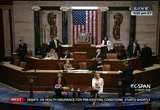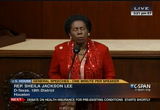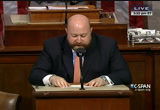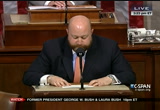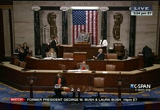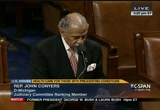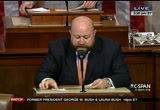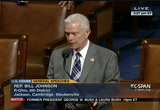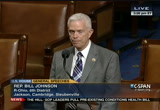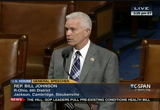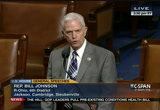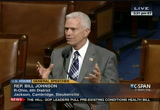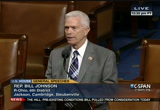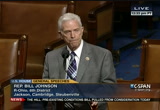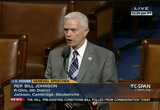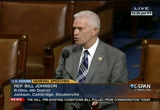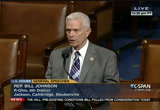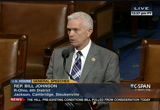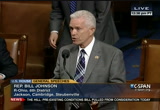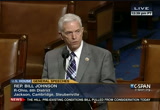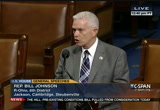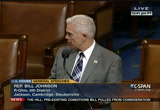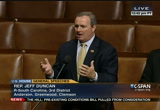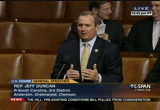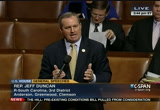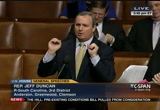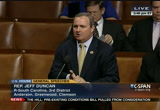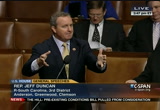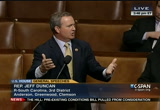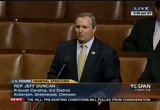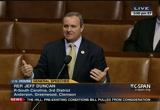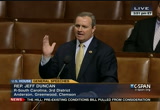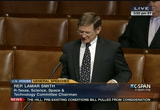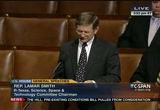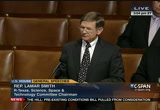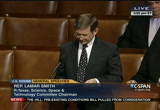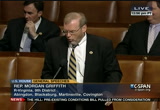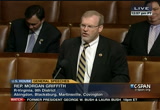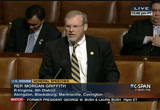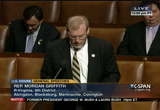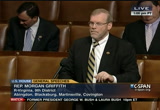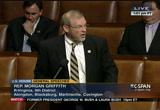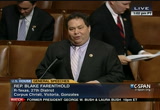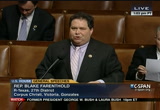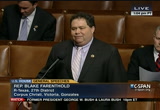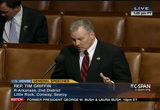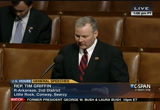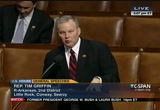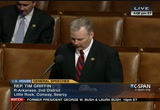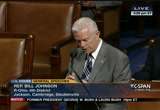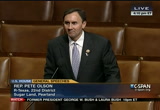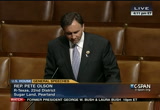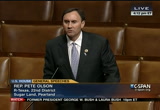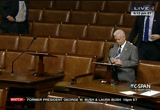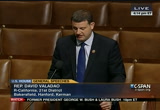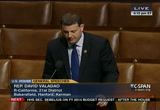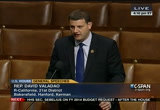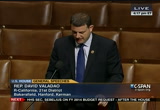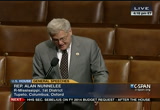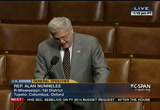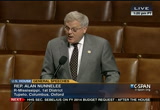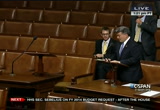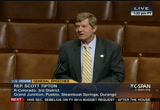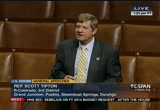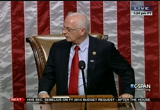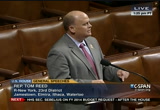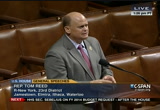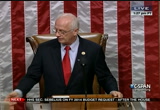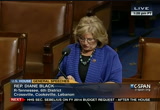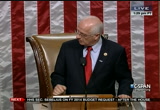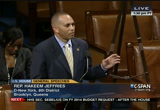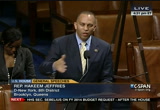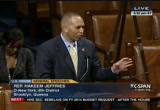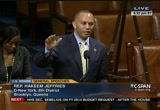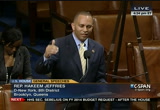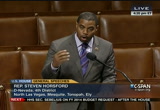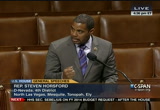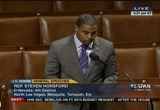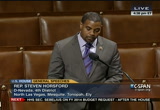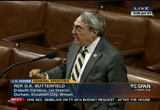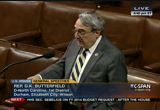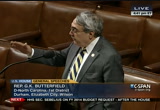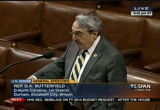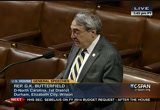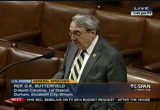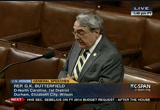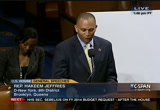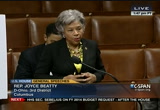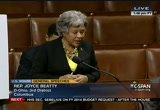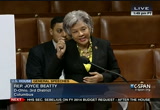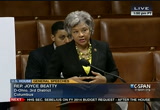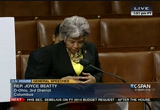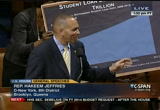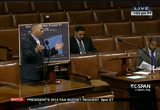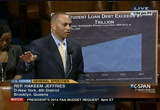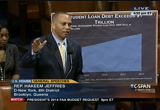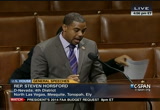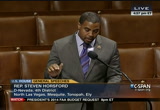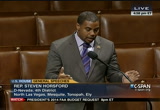tv Public Affairs CSPAN April 24, 2013 1:00pm-5:00pm EDT
1:00 pm
16th street baptist church in birmingham, alabama, 50 years ago this year. 1963 was a pivotal year in the struggle for civil rights in our nation. it marked 100 years after the emancipation proclamation and was the year of martin luther king jr.'s stirring letter from the birmingham city jail which sounded the call for nonviolent civil obedience to counter oppression in the jim crow south. in that letter, dr. king famously proclaimed, in justice anywhere is a threat -- injustice anywhere is a threat to justice everywhere. mr. speaker, as the veteran of those efforts, i know that the struggle for justice, empowerment and equal opportunity for all continues to this day. i want to thank my colleague, representative terri -- 10
1:01 pm
seconds -- terri sewell. the speaker pro tempore: the gentleman is recognized for 30 seconds. mr. clyburn: i want to thank my colleague, representative terri sewell for her leadership in this outstanding effort, representative sewell has quickly made her mark in this institution for her tireless devotion to duty and her thoughtful approach to legislating. i am proud to join her in this effort and urge all of my colleagues to support this legislation. i thank you and i yield back. the speaker pro tempore: the gentleman yields back the balance of his time. the gentlelady from alabama reserves. the gentleman from alabama. . mr. bachus: i yield one minute to the gentleman from alabama, mr. bonner. the speaker pro tempore: the gentleman from alabama, mr. bonner, is recognized for one minute. mr. bonner: thank you, mr. speaker. this is the right thing to do at the right time and for the right reasons. and hopefully in some small way this legislation will bring some form of closure to a cowardly act, one so outrageous it became a turning point in the passage
1:02 pm
of the civil rights act of 1964. on behalf of the people of alabama, i want to say a special thank you to our colleague, congresswoman terry sewell, and the dean of our delegation, congressman spencer bachus, in working together hand in hand to bring this very appropriate bill to the floor for consideration and a vote. while nothing he we do here will ever replace the loss of these four innocent young girls, especially to their families and to their loved ones who lived with the void in their hearts for the last 50 years, may this action today ensure that their spirit lives on forever. with that i urge the adoption of this bill and i yield back my time. the speaker pro tempore: the gentleman yields back. the gentleman from alabama reserves. the gentlelady from alabama is recognized. ms. sewell: mr. speaker, i yield two minutes to the distinguished leader of the democratic party, the gentlelady from california, s. pelosi.
1:03 pm
the speaker pro tempore: the gentlelady from california, the minority leader, vked for -- is recognized for one minute. ms. pelosi: thank you, mr. speaker. i thank our distinguished colleague, congresswoman sewell, for yielding. as you can see our distinguished democratic whip, mr. hoyer, and i have had the privilege, he more than i, to travel to alabama with john lewis. thank you this morning for informing the members that that was -- that's a transformative experience. anybody who travels there and sees what happened in the lifetime of many of us here, certainly in the lifetime of everyone's parents here in our very own country cannot help but be moved. i'm pleased to join you, congresswoman sewell, thank you, mr. chairman. mr. bachus, and mr. hoyer, and other colleagues in coming to the floor.
1:04 pm
mr. bishop. mr. speaker, as we are all acknowledging, 50 years ago on a sunday morning, four precious little girls walked into the 16th street baptist church in birmingham, alabama, the same day they did every week. these four little girls were there for sunday school. they were not civil rights activists, they were not agitators or advocates, they had simply come to church to learn, pray, to be with their friends, and classmates. when you visit there you see they didn't really have a chance. there is such close quarters when they went down those steps into that. these four little girls did not enter the church seeking to become symbols of the struggle of equality, yet in a moment of brutal, horrific, unspeakable tragedy, they would become icons of a movement for justice. the names, addy mae collins, denise mcnair, carole robertson,
1:05 pm
and cynthia wesley remain in the hearts of us today as painful reminders of a dark moment in our history. for their families, friends, loved ones, their loss in the bombing of 16th street baptist church would change their world forever. even at the time of great change across the country, little did we know that their deaths would bring -- would change our world forever. among the many milestones of the civil rights movement, september 15, 1963, may be bestowed with some of the greatest pain and anguish. it was on that day the world took notice of the violence inflicted in the struggle for equal rights. it was that day that stirred the conscience of our nation, galvanized the forces of justice, and spurred the momentum to pass the civil rights act and the voting rights act, landmarks set in righting the wrongs in our country's past. it was on that day that the 16th street baptist church became a
1:06 pm
symbol in the cause of human rights and dignity from the streets of birmingham to the community nationwide. it was that day once again reinforced what dr. martin luther king jr. just weeks earlier called the fierce urgency of now. these four girls made the ultimate sacrifice in the battle for civil rights, joining too many fellow americans in paying for freedom with their lives. this weekend i will join the southern poverty law center to rename and rededicate the civil rights memorial in montgomery, alabama. this memorial is a tribute to 40 individuals killed during the struggle. it is a place to remember the fallen, to take heed of their message, to deepen our understanding, and to he renew our commitment to equal rights under the law. there were four small little children going to church, four students, four daughters, four members of the tight n.i.t. -- tight knit community in
1:07 pm
birmingham, four victims to the forces of hatred and prejudice. their senseless and premature deaths ignited the fires for progress, fanned the flames of equality. as the resolution declares, i thank the gentlelady, one of our new -- not brand new but newer members of congress, for coming here and joining with colleagues , mr. bachus, mr. bonner, certainly, john lewis, and members of the congress not representing alabama but from alabama. as the resolution that she presents declares the legacy that these four little black girls left will live in the minds and hearts of all for generations to come. to honor that legacy, to cherish their memory, inscribe their names once more in the pages of history, it is only fitting to bestow our highest civilian honor, the highest honor that congress can bestow, the
1:08 pm
congressional gold medal on these four young americans. that will be a glorious day in the capital when we all come together under the rotunda, under the dome of the capital, to remember them. i hope that is a comfort to their families. came ave so much, so much from that and we will always remember. with that, mr. speaker, i yield back the balance of my time. the speaker pro tempore: the gentlelady yields back her time. the gentlelady from alabama reserves. the gentleman from alabama is recognized. mr. bachus: mr. speaker, i now yield two minutes to the gentleman from alabama, mr. aderholt. the speaker pro tempore: the gentleman from alabama, mr. aderholt, is recognized for two minutes. mr. aderholt: thank you, mr. speaker. i rise today to join my colleagues as mentioned in support of h.r. 360. and honor the memory of addie mae collins, denise mcnair, carole robertson, and cynthia wesley who lost their lives at the 16th street baptist church in birmingham. what we do here today honors these four innocent young girls whose lives were sacrificed in
1:09 pm
an act of hatred and violence. and no doubt their death, as has been mentioned, marked a significant turning point in the civil rights movement in the 1960's. as congressman bachus mentioned in his opening remarks, these four young girls that were age -- range from age of 11 to 14, were walking into the basement of the 16th street baptist church to hear a sermon that was, ironically entitled, the love that forgives. though they could not have known at the time, these four little girls changed the course of history for our nation. addie mae collins, denise mcnair, carole robertson, and cynthia wesley's young lives were cut short on september 15, 1963, but their legacy still lives on today. and especially with what we do here by the congressional medal of honor which is america's highest civilian honor. i want to thank my kwleeg, ms. sewell, for her leader --
1:10 pm
colleague, ms. sewell, for her leadership on this bill and i'm a proud supporter of h.r. 360, and thank mr. bachus for his time to speak on the legislation. i yield back the balance of my time. the speaker pro tempore: the gentleman yields back. the gentleman from alabama reserves. the gentlelady from alabama is recognized. ms. sewell: mr. speaker, i now yield two minutes to the distinguished democratic whip, the gentleman from maryland. and my dear friend. the speaker pro tempore: the gentleman from maryland is recognized for two minutes. mr. hoyer: i thank congresswoman sewell for her leadership and for yielding this time. i thank my good friend, spencer bachus, for his leadership as well. congratulate him and his family for the courage they showed at a ime of great stress. mr. speaker, the recognition for the victims of this terrible tragedy that fell on the whole country on september 15, 1963,
1:11 pm
is absolutely appropriate. and it is an opportunity for us to say once again the respect we have for these young girls. respect we have for their families. i say our whole country because a wound opened in the soul of america that day from a heinous act of racism and terror. those who set a bomb inside the 16th street baptist church, it was outside, that sunday did so because they believed in a nation where not all are created equal. where not all are entitled to life and liberty. on that day many americans were turned away with indifference could no longer look away. since that day we have forcefully declared to future generations that america will not be that nation that looks away.
1:12 pm
in america we strive to he protect our children from hurt and harm no matter what the color of their skin, their faith, or their national origin. we hold fast to the values of a memory of these four little girls who were killed that day, not the twisted, warped, hate ideals of their killers. -- hateful ideals of their killers. their names have been mentioned but warrant rementioning. addie mae collins, cynthia wesley, carole robertson, denise mcnair. four of god's children, four beautiful children of america. may i have two minutes? i thank the gentleman for yielding two minutes. the speaker pro tempore: the gentleman is recognized for two minutes. beautiful young girls
1:13 pm
. you go down into the basement of the children you see their pictures, the memorial. and your heart cries. they were brutally murdered while attending sunday school, the leader, spencer bachus, and terri sewell has related. my colleagues, let us honor their lives and their faith in the face of the evil of segregation and prejudice and hate. let us remember the words of dr. martin luther king jr. from the funeral of three of those four little girls. he said this, they have something to say to each of us in their death. their death says to us that we st work passionately and unrelentingly for the realization of the american dream.
1:14 pm
that fight began with the declaration of independence. that we hold these truths to be self-evident, that all men, i'm sure jefferson meant mankind, women as well, are endowed by god, not by the constitution, not by votes on this floor, by god with unalienable rights and among these are life, liberty, and the pursuit of happiness. these four little girls had those robbed that day. let us recommit ourselves, let us recommit ourselves to that proposition and to unrelentingly and courageously ensure that that dream, that that promise is fulfilled. for all of the little children of this nation and for all the
1:15 pm
adults as well. let us pass this bill, mr. speaker, and send the message that we will never, ever forget their memory. i yield back the balance of my time. the speaker pro tempore: the gentleman from maryland yields back his time. the gentlelady from alabama has 5 1/2 minutes remaining and reserves. the gentleman from alabama has 10 1/2 minutes and is recognized. mr. bachus: thank you, mr. speaker. mr. speaker, i'd like to acknowledge and thank mr. hoyer for his recognition of my father's role. our family, very proud of my father and the courage he showed. . at this time i yield two minutes to the esteemed chairman of the financial services committee, the gentleman from texas, mr. hensarling. 2 1/2 minutes. the speaker pro tempore: the gentleman from texas is recognized for 2 1/2 minutes. mr. hensarling: thank you, mr. speaker. i thank the gentleman for yielding. and i want to rise in strong support of h.r. 360. to posthumously bestow congress'
1:16 pm
highest civilian honor to addie mae collins, cynthia wesley, carole robertson and denise mcnair. i also want to commend my two colleagues on the financial services committee, ms. sewell and her chairman emeritus, chairman bachus from alabama, for bringing this bill before the house. mr. speaker, i was a mere child when these innocents were murdered. i'm no longer a child. but i'm a father of two small children, a 9-year-old and an 11-year-old. i cannot imagine the unspeakable horror of knowing that my children were in church and one of the great acts of evil known in our nation's history could be perpetrated upon them.
1:17 pm
that act 50 years ago jarred millions in our nation to the realization that racial prejudice and hatred had just manifested itself in pure, unimaginable evil. an within a year this body had passed the 1964 civil rights act . in his eulogy for these four little girls, dr. marten luther king jr. said, quote, these children, unoffending, innocent and beautiful, were the victims of one of the most vicious, heinous crimes ever perpetrated against humanity. yet they died nobly. they are the martyred heroines of the holy crusade for freedom and human dignity. mr. speaker, i certainly cannot add to the words of this great american hero, martyred himself.
1:18 pm
i will just end by saying, mr. speaker, it is a good and right thing that this body honor these innocent children martyrs, that we never forget, that we always confront evil and although our nation was founded on noble principles, we must never cease the work of making america a more perfect union and with the passage of this bill, i think we do one small act to do that. mr. speaker, i yield back the balance of my time. the speaker pro tempore: the gentleman from texas yields back his time. the gentleman from alabama reserves. the gentlelady from alabama, ms. sewell, is recognized. ms. sewell: mr. speaker, i yield to the dean of the house, the gentleman from michigan, mr. dingell. one minute. mr. dingell: i ask unanimous consent to revise and extend my remarks. the speaker pro tempore: the gentleman from michigan is recognized for one minute. mr. dingell: mr. speaker, i
1:19 pm
commend the sponsors of this legislation and i urge the adoption of the bill. it is appropriate that we should honor these four young wind chill who gave so much -- young women who gave so much to the cause of civil rights. they gave their lives. just before this event, we had passed the civil rights act of 1957. immediately thereafter we passed legislation co-sponsored by the gentleman from tennessee, mr. mr. loser, and i which made it a crime to travel in inner state commerce for the purposes of destroying buildings or churches. and shortly thereafter, outraged by the events that took place on this awful day, the congress passed the 1964 and then the 1965 civil rights anth. these four beautiful children -- act. these four beautiful children contributed in a most meaningful
1:20 pm
way to those events which caused the legislation to become law. and they saw to it that we honor their decision to today with enactment of this legislation -- doings today with enactment of this legislation. the speaker pro tempore: the gentleman's time has expired. the gentlelady from alabama reserves. the gentleman from alabama. mr. bachus: thank you, mr. speaker. mr. speaker, at this time i'll reserve -- oh, i'm sorry. mr. speaker, i now yield 1 1/2 minutes to the gentleman from pennsylvania, mr. fitzpatrick, who has visited the 16th street baptist church with us and i thank him for doing that. the speaker pro tempore: the gentleman is recognized for a minute and a half. mr. fitzpatrick: i thank my friend, mr. bachus from alabama. mr. speaker, i rise also to urge passage and support of the bill. as we commemorate the 16th street baptist church bombing in birmingham. it was a sunday morning, it was september 15, 1963, and i think
1:21 pm
it's appropriate we mention their names again. addie mae collins, cynthia wesley, carole robertson and denise mcnair. they were entering their church before the 11:00 a.m. service when a bomb detonated on the church's east side. and the explosion killed all four young girls and maimed dozens of the parishioners there. the bombing that have church gave further mow momentum in the struggle to end segregation and helped to spur support for the passage of the landmark civil rights act right here in this chamber. last month many of us were honored to commemorate that event and another event that served as a catalyst for action in the civil rights movement. i also joined other members of congress in the annual pilgrimage across the bridge in selma, alabama, the event that marked the beating of peaceful voting civil rights marchers, notably sunday on march 7, 1965. and the pilgrimage was meaningful as other members of
1:22 pm
congress and i reflected on together how far week of come as a country. bloody sunday and the 16th street baptist church bombing remind us of the long and difficult struggle to end segregation. and it is immensely important, mr. chairman, that we commemorate these moments and these four little girls. that they led to the advancement of civil rights for the african-american community and for our entire country. so again i urge passage of the bill and i yield back the balance of my time. the speaker pro tempore: the gentleman yields back the balance of his time. the gentleman from alabama. mr. bachus: mr. speaker, i ask unanimous consent that four minutes of my time be given to ms. sewell to manage and reserve the balance of my time. and i do that in acknowledgment of her fine work on this legislation. and those of her colleagues who visited the church. the speaker pro tempore: without objection, the gentlelady from alabama will control the time, four minutes.
1:23 pm
ms. sewell: mr. speaker, i want to thank the gentleman from alabama. it has been a pleasure to not only represent jefferson county him but to serve in this body with you and i thank you for yielding me that time. i now yield two minutes to the distinguished gentleman from georgia, mr. lewis, two minutes. while he may represent georgia, we claim him as alabama's native. the speaker pro tempore: the gentleman from georgia is recognized for two minutes. mr. lewis: mr. speaker, i want to thank my friend, congresswoman sewell, and my friend, congressman bachus. it is true that i grew up in alabama. and i represent georgia. ut alabama is in my blood. i want to thank the two of you for bringing this resolution forward.
1:24 pm
to honor these four beautiful little girls killed by a bomb on september 15, 1963, at the 16th street baptist church. on that sunday, when i heard about the bombing that morning, i traveled to the city of birmingham and stood outside of the church with my friend and my co-worker, julian barn. we stood and we looked at the church. later i had an opportunity to attend the funeral of three of the little girls. the bombing took place 18 days after martin luther king jr. had stood here in washington and said, i have a dream, a dream deeply rooted in the american dream. t was a sad day.
1:25 pm
iter to out the essence of our -- it tore out the essence of our hearts. but we didn't give up. we didn't become bitter. we didn't become hostile. we continued. because of what happened in birmingham, it inspired us to go to selma, to fight for the right to vote. i think we're doing the right thing today by honoring these four little girls. they must be looked upon as those who gave their very lives, gave their blood to help redeem the soul of america and move us .loser to the beloved community , what andometimes why how? we're a different country and we're a better country because they gave their all. thank you and i yield back.
1:26 pm
the speaker pro tempore: the gentleman from georgia yields back his time. the gentlelady from alabama. ms. sewell: mr. speaker, i yield 1 1/2 minutes to another native of alabama who happens to represent georgia, the gentleman from georgia, mr. bishop. the speaker pro tempore: the gentleman from georgia is recognized for a minute and a half. mr. bishop: i thank the gentlelady for yielding. i too, alabama named me but georgia claimed me. i remember vividly the sunday of the bombing. as a young boy in mobile, alabama. i'm reminded of the words of james well -- weldon johnson. felt in the days when hope unborn had died. yet with the steady beat have not our weary feet come to the place for which our fathers sighed, we have come over a way that with tears has been walked -- watered. we have come treading our path through the blood of the
1:27 pm
slaughtered. out from the gloomy path until now we stand at last, where the white gleam of our bright star is cast. addie mae collins, denise mcnair, carole robertson, cynthia wesley, four little girls are bright stars in the constellation shining down now as beacons of light for freedom and justice. and so today, 50 years after the senseless bombing in birmingham, it's altogether fitting and proper that we should look back, commemorate the significance of the sacrifice that these young .irls, these four young lives truly it was a turning point and the murder of these youngsters whose only crime was going to the bathroom in church, but it
1:28 pm
sparked a nation not only to mourn the death of nnlts but to act, to quell the turmoil and to move us toward freedom. i'm happy to join my colleague, congresswoman sewell, congressman bachus, and all of the colleagues here in this house to appropriately pass legislation to award the congressional gold medal to these four young martyrs in the fight for freedom. i yield back the balance of my time. the speaker pro tempore: the gentleman yields back the balance of his time. the gentlelady from alabama. ms. sewell: mr. speaker, i yield 1 1/2 minutes to the former chair of the congressional black caucus, the gentleman from missouri, mr. cleaver. the speaker pro tempore: the gentleman from missouri is recognized for a minute and a half. mr. cleaver: mr. chairman, congratulations to you, ms. sewell, and to mr. bachus. i have returned home from a
1:29 pm
movie. we went to church, we could have other opportunities to do other things and i went to church. so my parents allowed me to go to the movies. when my sisters and i walked back into the house, our mother was in the living room with some friends and they were crying. and we didn't know what happened. and she said, they killed some little black girls down in birmingham. i had no idea that i would eventually become deeply involved in the southern christian leadership conference. and i realized later that the reason for the bombing of the 16th street church is that it had been the headquarters, the meeting place of the southern christian leadership conference led by martin luther king jr., the vice president ralph david be aer naggetty, my father in the ministry, who wrote to me, i am your paul, you are my silas, and fred shuttlesworth who says he taught me how to preach.
1:30 pm
and they met there and that was reason enough to blow up that building and kill these little girls, innocent little girls. was pleased in 1979 when richard aaronnington was elected mayor of birmingham and i remember thinking, fred shuts worth had coined the term -- shuttles worth had coined the word bombingham because his own home was blown to bits and on the day that richard aaronnington was elected mayor, i said, it is no longer bombingham, it is now birmingham. . ms. sewell, congratulations to you. this should be done, it is being done. the speaker pro tempore: the gentleman yields back the balance of his time. the gentlelady from alabama reserves. the gentleman from alabama is recognized. mr. bachus: thank you. mr. speaker, i yield myself one
1:31 pm
minute. the speaker pro tempore: the gentleman is recognized for one minute. mr. bachus: what we need to fully realize is that the civil rights victories were achieved with the guiding principle of nonviolence. there are many regions and nations in the world that have been trapped in endless cycles of ethnic and political violence across multiple generations that has torn the fabric of their societies and families. we always like to think that they could never happen here. it did not happen during the civil rights movement because of the principle of nonviolence. i journeyed at john's invitation to india where we retraced the steps of martin luther king as he retraced the journey of gandy -- gandhi. dr. king took his own religious convictions, affirmed and strengthened by those of gandhi, and brought back a powerful
1:32 pm
nonhaven't movement -- nonviolent movement which overcame police, dogs, fire, water hoses, brutal beatings, bombs, bullets, and acts of violence in a nonviolent way. and really love carried the day against hate. that was a proud moment for our country, and it is a model as we go forward. we in america have the right to petition our government in a peaceful way, and let us use that example and that tradition. thank you. with that, mr. speaker, i yield the balance -- actually i ask unanimous consent that the balance of my time be given to ms. sewell and to other speakers to manage as she sees fit and give her the right to close which i think should be her honor. the speaker pro tempore: without objection, the gentlewoman from alabama, ms. sewell, controls the time.
1:33 pm
ms. sewell: mr. speaker, i again want to thank the gentleman from -- the speaker pro tempore: the gentlelady controls the time. and the gentlelady has five minutes. ms. sewell: thank you, mr. speaker. again thank you, the gentleman from alabama, it's indeed an honor to be able to manage the floor with you on this bill and to co-sponsor it with you. i thank you for your generosity. at this time i yield a minute and a half to the distinguished gentlelady from texas, ms. heila jackson lee. the speaker pro tempore: the gentlelady from texas is recognized for a minute and a half. ms. jackson lee: i ask unanimous consent to address the house. the speaker pro tempore: without objection. ms. jackson lee: often we are christian baptist and african-american tradition, which is paraphrasing the words of the bible, give honor unto
1:34 pm
those whom honor is due. for that reason i can give tribute to the two members of congress without reservation for recognizing the importance, both congresswoman sewell, congressman bachus, for giving onor to those families who languished for over 50 years and wondered did anybody care. thank congresswoman sewell for her great leadership and congressman bachus for joining and exuding the kind of partnership, the spirit of his family tradition, and against all adversity saying i want to join and to speak of nonviolence. i rise today with great enthusiasm for h.r. 360, and say to the family members, the sisters, the friends of addie
1:35 pm
mae collins and carole robertson, and cynthia wesley, denise mcnair, it has been too long. we rise today to be able to make amends for justice that has not been served. because of the callousness and indifference, sometimes criminal collusion, many times the lack of enforcement of devastation against colored, blacks, negros, and african-americans there was an era we look sadly upon. but now today in the spirit of dr. king's message of nonviolence, we are able to say s, profoundly yes in support -- the speaker pro tempore: the gentlelady is recognized for 30 seconds. ms. jackson lee: i thank the gentlelady for her kindness. we are now able to say profoundly that we honor these girls' relatives, the children that lost their future. we honor them by saying to their families, we care for you.
1:36 pm
and in the words of john f. kennedy, we are confronted with an issue as old as the scriptures and clear as the american constitution. justice delayed is sometimes justice denied. but as martin luther king said in the birmingham jail, go wherever injustice is. today on the floor of the house we will remedy injustice. i'm delighted to be a supporter and co-sponsor of this great resolution. i yield back. the speaker pro tempore: the gentlelady's time has expired. the gentlelady from alabama. ms. sewell: mr. speaker, i yield two minutes to the gentleman rom illinois, mr. davis. the speaker pro tempore: without objection, the gentleman from illinois is recognized for two minutes. mr. davis: thank you, mr. speaker. and i want to thank the the gentlewoman from alabama for yielding time. i want to commend her for her leadership and commend the leadership of representative bachus.
1:37 pm
from alabama. i remember that day vividly as a young activist at the time, and we thought it was unbelievable that this kind of tragedy could take place, but i think it reminds all of us that yesterday is yesterday. we look forward to tomorrow, and i commend the gentlewoman again from alabama and mr. bachus for reminding us of that time and what can happen when we join hands together. so i thank you both and yield back the balance of my time. the speaker pro tempore: the gentleman yields back the balance of his time. the gentlelady from alabama. ms. sewell: mr. speaker, i yield one minute to the distinguished gentlewoman from texas, ms. johnson.
1:38 pm
the speaker pro tempore: the gentlelady from texas is recognized for one minute. ms. johnson: thank you very much, mr. speaker. you know, i think many times people wonder why so often we go back and give homage to our past . it's because we still suffer the damages of the past. and we want to give to families that have given us so much just for us to be able to vote. and we still struggle for that vote. we still struggle for the right to vote, but woo must continue. and i want to say to these families, and i know some of them personally, how much we appreciate the fact that they have been loyal to the cause, loyal to this country, loyal to our military, and stand strong today. so i want to thank you very much for giving honor, thanks to my colleague, and i yield back.
1:39 pm
the speaker pro tempore: the gentlelady yields back her time. the gentleman from alabama has one minute remaining. ms. sewell: i want to conclude by thanking all of my colleagues, especially my colleagues from alabama, and all of my colleagues who have participated in today's debate. it is indeed an honor and a privilege for me, a native of selma, alabama, 30-year member of brown chapel a.m.e. church to have the humble honor of being able to be a sponsor of this bill. i know that i dredge deep from wells i didn't dig. my whole generation does. it's a long time overdue but i want to say humbly thank you and i urge all of my colleagues to support h.r. 360. again thank the gentleman, mr. bachus, from alabama. it has been an honor to serve with you and to share this time with you. i yield back the remainder of my
1:40 pm
time. the speaker pro tempore: the gentlelady from alabama, ms. sewell, relinquishes all time. both sides having used their time the question is will the house suspend the rules and pass the bill h.r. 360 as amended. so many as are in favor say aye. those in favor say aye. those opposed, no. in the opinion of the chair, 2/3 of those voting having responded in the affirmative, -- the lady from alabama is recognized. ms. sewell: i ask for a recorded vote. the speaker pro tempore: does the gentlelady ask for the yeas and nays. ms. sewell: yes i do, sir. the speaker pro tempore: the jeans are requested. all those in favor of taking this vote by the yeas and nays will rise and remain standing. a sufficient number having arisen, the yeas and nays are ordered. pursuant to clause 8 of rule 20, further proceedings on this motion are postponed.
1:41 pm
1:42 pm
committee on rules, i call up house resolution 175 and ask for its immediate consideration. the speaker pro tempore: the clerk will report the resolution. the clerk: house calendar number 19, house resolution 175, resolved, that at any time after the adoption of this resolution, the speaker may, pursuant to clause 2-b of rule 1 declare the house resolved into the committee of the whole house on the state of the union for consideration of the ill bill h.r. 1549, to amend public law 111-148, to transfer fiscal year 2013 through fiscal year 2016 funds from the prevention and public health fund to carry out the temporary high risk health insurance pool program for individuals with pre-existing conditions, and to extend access to such programs to individuals who have had credible coverage during the six months prior to application, or coverage through such programs. the first reading of the bill shall be dispensed with. all points of order against consideration of the bill are
1:43 pm
waived. general debate shall be confined to the bill and shall not exceed one hour equally divided and controlled by the chair and ranking minority member of the committee on energy and commerce. after general debate, the bill shall be considered for amendment under the five-minute rule. in lieu of the amendment in the nature of a substitute recommended by the committee on energy and commerce now printed in the bill, it shall be in order to consider as an original bill for the purpose of amendment under the five-minute rule an amendment in the nature of a substitute consisting of the text rules committee print, 113-8. that amendment in the nature of a substitute shall be considered as read. all points of order against that amendment in the nature of a substitute are waived. no amendment to that amendment in the nature of a substitute shall be in order except those printed in the report of the committee on rules accompanying this resolution. each such amendment may be offered only in the order printed in the report, may be offered only by a member designated in the report, shall be considered as read, shall be debate -- debate for the time
1:44 pm
specified in the report equally divided and controlled by a proponent and opponent, shall not be subject to amendment, and shall not be subject to demand for division of the question in the house or in the committee of the whole. all points of order against such amendments are waived. at the conclusion of consideration of the bill for amendment, the committee shall rise and report the bill to the house with such amendments as may have been adopted. any member may demand a separate vote in the house on any amendment adopted in the committee of the whole to the bill or to the amendment in the nature of a substitute made in order as original text. the previous question shall be considered as ordered on the bill and amendments thereto to final passage without intervening motion except one motion to he recommit with or without instructions. the speaker pro tempore: the gentleman from texas, mr. burgess, is recognized for one hour. mr. burgess: i thank the speaker. mr. speaker, for the purposes of debate only, i yield the customary 30 minutes to the gentlelady from new york, ms. slaughter, pending which i yield
1:45 pm
myself such time as i may consume. during consideration of this resolution all time is yielded for the purpose of debate only. mr. speaker, i also ask unanimous consent that all members may have five legislative days to revise and extend their remarks. the speaker pro tempore: without objection, the gentleman from texas is recognized. . mr. burgess: this provides for a structured rule for consideration of the bill. the rule provides for one hour of general debate equally divided by the chair and the ranking member on the committee on the energy and commerce. the rule makes in order two amendments, one republican, one democratic, with 10 minutes of debate for each. further, the rule provides for one motion to recommit with or without instructions. mr. speaker, i rise today in support of the rule and the underlying bill. the underlying legislation is a needed piece of relief for the hundreds of thousands of americans who were promised by their president that they would be covered under the affordable care act's pre-existing condition insurance plan and
1:46 pm
then were told as of february 1 of this year, sorry, we're closed. this is one of the many promises the president made that he has failed to uphold. in response to the president's failed promise, chairman joe pitts introduced h.r. 1549, the helping sick americans act, to continue to provide insurance for those americans who are most in need of immediate care. and to pay to give those most vulnerable patients insurance and care, we use the prevention of public health fund, an allocation of money that should be going to help patients but it's instead being used for administrative costs to set up the exchanges that won't be online for some time now and for glossy brochures to ex toll their virtues. the money could be used to help money now. and that's why republicans are here today. the affordable care act created the new pre-existing condition insurance plan which was arguably duplicative of actions taken by 35 states prior to 2010
1:47 pm
that were operating risk pools, that were operating re-insurance programs and served over 200,000 americans. it has been shown that state-based programs play an important role in lowering costs across markets and in providing coverage options for those with pre-existing conditions. in some states, those plans , rged with the federal plan into an existing high-risk pool. in other states like texas, the federal plan operates in parallel to the state's pool. but whether the states merge their pools,ed a do not a state-ministered pre-existing plan or whether the federal pre-existing plan is the only option this program is the only answer for those who have found themselves unable to purchase insurance on their own because of a medical condition. shortly after the passage of the patient protection and affordable care act, the chief act wear for the centers of med -- actuary for the centers of medicare and medicaid services estimated that the creation of
1:48 pm
this program would result in roughly 375,000 people gaining coverage in 2010. however, to date, only 107,000 individuals were enrolled in the program as of january 1 of this year. on february 15 of this year, the center for medicaid and medicare services announced to states that the agency was suspending enrollment in the pre-existing condition insurance program. very little was said of the fact that this program was intended to help individuals with pre-existing conditions through the first of january of 2014. despite lower than expected enrollment, the center for medicare and medicaid services announced it would no longer enroll new individuals in the program and it will bar states from accepting new applications because of their financial constraints. according to a report from "the washington post," tens of thousands of americans who cannot get health insurance because of pre-existing medical problems will be blocked from
1:49 pm
the program that was actually designed to help them. on march 5, along with republican leadership and the leadership from the energy and commerce committee, we wrote to the president. we let him know that this was not right. we let him know that while we may have designed the pre-existing pool differently, republicans have supported risk pools and that could he easily use funds from other accounts in the affordable care act like the prevention of public health fund. but so far the response to our letter from the president is zero. i support prevention activities. as a doctor i know it's better to keep a person well than to treat an illness. and to anyone across the aisle, we demonstrated this in the past, if we want to modernize government programs where they have fallen behind, what private insurers and employers, in avoiding disease and getting people more involved in their health care, we're here to talk. but the prevention fund has been used in a haphazard way with no unified vision and many ways
1:50 pm
that are quite questionable, with a mere hope and aspiration that 10 years from now we can look back and think that we've made a difference. but, you know, it's really something i cannot support. when we are $17 trillion in debt, sick americans are being turned away from an insurance coverage that they were promised by the president. as a physician, ensuring those with -- insuring those with pre-economisting conditions and ensuring they have access to quality insurance is a priority. as much as i believe that the affordable care act stretched the bounds of constitutionality, and i still do, i was concerned that if the supreme court had invalidated the law last summer, those who were in this new federal pre-existing pool would have had the rug pulled out from under them and they could have been barred from merging into their state's pool because of the previously provided coverage. that's why to ensure that that did not happen, i was prepared to answer that challenge, had it arisen, by introducing legislation prior to the court's decision to provide states with the financial backing to decide
1:51 pm
how best to provide coverage for this population through some type of risk pool re-insurance or other innovative method. i will also note that unlike many of the complaints that the pre-existing condition insurance program has faced, that that bill, as well as the bill that we are considering today, did not require those with pre-existing conditions to jump through hops or -- hoops or to remain uninsured for six months before being eligible for coverage. on the other hand, instead of making sick americans a priority, the administration is telling them, just give it 10 more months. well, what a striking comparison. there are always stories of those who have done the right thing and insured themselves and then for whatever reason, falling on bat luck or hard times have fallen out of the system, usually because of a job loss. they get a medical diagnosis when their employment status changes, they find themselves forever locked out of coverage. those were the stories that people thought of when they did
1:52 pm
say they wanted something done about this issue. and i might add that the administration and congressional democrats when the affordable care act was passed, vastly oversold this concept. we were told time and again there were eight million to 12 million to 15 million people wandering the country with some type of pre-existing exclusion and were excluded from coverage. interesting now here we are three years later spending $5 million and they've enrolled 100,000 people in the program. but it's $100,000 people with a very compelling -- 100,000 people with a very compelling story. and we were told by the american people they wanted us to fix this problem, they didn't want to us screw up the rest of the country's health care and they wanted some help with cost. but unfortunately we failed on every one of those counts. since the administration has cut off enrollment, how many people have signed into or aged into the six-month exclusion that would otherwise be able to sign up? fact is, we don't know. but we had a hearing four weeks ago where we heard from some of these people and they do have
1:53 pm
compelling stories. how many were awaiting coverage but are now told, especially in states where the federal pre-existing program is the only option, you just got to wait you just got to wait until 2014 but do the best you can with what you've got between now and then? i will admit that many of the current state-based programs are underfunded and lacking the .bility to meet their needs it is costly to deal with this population of patientses. and i was prepared in the bill that i offered last summer to authorize $30 billion to provide coverage. house republicans supported $25 billion in our substitute to the affordable care act back in november of 2009. h.r. 1549 will redirect $3.5 million for the prevention of public health fund and then eliminate the fund in 2016. congressional budget office estimates that unlike the authors of the affordable care act, we have provided enough funding to meet the needs of the program through the end of the
1:54 pm
year while ultimately reducing the deficit. furthermore, once the train wreck of failed implementation occurs, the amendment that mr. pitts plans to offer would provide an escape valve for americans with a pre-existing condition by providing states with a block grant to fund state risk pools. the majority is serious about funding these programs and dealing with the issue. and those costs are a drop in the bucket as to what the affordable care act will cost our country in the future. but those efforts recognize that for those who do need insurance and are truly uninsurable in the market, it will be costly, but we will make the decisions that set our priorities straight. where the president's response was to tell people tough luck, not to prepare for needing more money or transfer funds out of other parts of the affordable care act, or to look for efficiencies or mismanagement in the pre-existing condition program, or even approach congress for funding, dead silence from the administration. well, here republicans will lead and ensure that we help sick americans now.
1:55 pm
i reserve the balance of my time. the speaker pro tempore: the gentleman from texas reserves the balance of his time. the gentlelady from new york is recognized. ms. slaughter: thank you, mr. speaker. good afternoon. i thank the gentleman for yielding me the customary 30 minutes. and yield myself such time as i may consume. the speaker pro tempore: the gentlelady is recognized for as much time as she wishes to consume. ms. slaughter: thank you very much. mr. speaker, we begin this week the way we've begun every week since january. spinning our wheels. as we speak, sequestration is hitting communities across our country. flight delays have started, head start programs are turning away children and unemployment benefits are being curtailed. but despite the calls to stop the sequestration, the majority refuses to act. in fact, the ranking member of the budget committee, representative van hollen, has come four times to the rules committee with an amendment that would repeal sequestration but the majority has rejected it every single time. the majority's also left the job
1:56 pm
of passing a budget unfinished. with budgets passed by both the senate and the house, it is now time to finish the job and for the majority to constantly -- that constantly calls for regular order and concerns it self with no senate budget, they now refuse to appoint the conferees and they must. if we're going to get the budget. instead of taking meaningful action on these two important issues, the majority is proposing a bill that is nothing more than a political gimmick. as everyone knows, there's no chance the senate will consider this bill. even if it did, the president's senior advisers have stated that they would recommend the president veto the bill. in the short history of the 113th congress, i have been repeatedly dismaid that the leadership of this chamber has refused to bring forth meaningful legislation that has any chance of becoming law. and today is a telling example of the majority's failure to lead. in news reports earlier this
1:57 pm
morning, we were told that today's bill, dubbed by reporters as, quote, cantorgate, unquote, may even be pulled before it gets a vote. one member of the majority was reported to say that if today's bill does nothing but shift money from a program he doesn't support to another program he doesn't support and indeed given the fact that not a single republican voted for the care act, it seems uncongress to me that they are now here today with great bleeding heart concerns about the people with previous conditions that keep them from being insured. so give the multiple reports of dissent within the majority, i have so to ask, if no one supports this bill, then what are we doing this afternoon? except as i pointed out earlier what we do every week. even if we continue to move forward on the bill, it is already clear the legislation is solely designed for political gain. while the majority claims that they want to strengthen the affordable care act, their
1:58 pm
intent is clear. they want to repeal the law. last week health and human services secretary kath line sebelius testified before the senate finance committee, where she was criticized by g.o.p. senators, for using her lyle legal authority to fund the implementation of the affordable care act. as secretary sebelius replied in her testimony, congress' failure to pass a budget forced her to take the independent action which she's allowed to do in order to fund the implementation of the affordable care act. it's as simple as that. in the face of an unproductive congress, secretary sebelius has done everything she can to provide the -- like saving health care to the american people. while reporting on secretary sebelius' testimony, "the washington post" columnist ezra kline explained the majority's approach toward the affordable care act. in part he wrote, quote, in so far as the republican party has a strategy on obamacare, it goes
1:59 pm
like this, the law needs to be implemented, the g.o.p. can try and keep implementation from being done effectively in part by refusing to authorize the needed funds, as they did in this case. i think $1.5 billion. then they can capitalize on the problems that they have created to weaken the law, or at least weaken democrats up for re-election in 2014. in other words, step one, create problems for obamacare. step two, blame obamacare for the problems. step three, political profit, end quote. the legislation before us is little more than a continuation of these gains. if the majority were making serious attempts to expand health care coverage, they wouldn't be funding their proposal with money from a different program. and the affordable care act. specifically, the majority wouldn't be removing $4 billion from the prevention in public health fund. this is a fund already helping
2:00 pm
states research ways to reduce instances of cancer, obesity and heart disease. preventive health mother measures are vie toll at that -- vital to reducing the cost of health care in the united states because we know it's always cheaper to prevent a disease than treat if. in an age where more than 33% of our population is overweight or obese, when heart disease is the number one cause of death and the number of diabetes cases continue to grow, including children, vetting our nation's -- gutting our nation's only federal preventive health care program is not a good budget decision, it is simply an underhanded attack to dismantle the affordable care act one program at a time. . the new concern for people who are insured because of pre-existing conditions might be more believable if they had shown -- allowed one of the new commonsense amendments prepped to the rules committee to come to the floor. among the amendments were responsible proposals to cover americans with pre-existing
2:01 pm
conditions by ending the tax breaks for big oil. ending the subsidies for the owners of corporate jets. increasing taxes on cigarettes, a preventive health measure in its own right. proposals like these would expand health care to those who need it, while protecting the preventive health measures including in the affordable care act. it is truly unfortunate that another restrictive process educated by the majority, these amendments were denied a vote on the house floor. the majority anti-press have made it clear that today's bill is a political gimmick that has no chance of becoming law. i urge my colleagues to vote no on today's rule and the underlying legislation. and i reserve the balance of my time the balance of my time. the speaker pro tempore: the gentlelady from new york reserves her time. the gentleman from texas, mr. burgess. mr. burgess: mr. speaker, i yield one minute to the mr.leman from pennsylvania, rothfus. the speaker pro tempore: the gentleman from pennsylvania is
2:02 pm
recognized for one minute. mr. rothfus: i ask unanimous consent to revise and extend my remarks. the speaker pro tempore: without objection. mr. rothfus: i rise in support of the rule, the helping sick americans now act, and the pitts amendment. president obama's health care law is a train wreck. we learn more every day about its failures. h.r. 1549 addresses the problem with the law's provisions for those with pre-existing conditions. the bill takes millions of dollars that the administration intends to spend on advertising its failed law, and instead helps some of the sickest americans get health insurance. not only that, the bill will also end the obamacare slush fund and reduce the deficit. h.r. 1549 is a win on all fronts. we thaud applaud chairman joe pitts for bringing this commonsense solution forward and i urge my colleagues to support the rule and bill. i yield back the balance of my time. the speaker pro tempore: the gentleman yields back the balance of his time. the gentleman from texas reserves. the gentlelady from new york is
2:03 pm
recognized. ms. slaughter: mr. speaker, we will be doing, as i said, a previous question, to amendment to this rule to hold a vote on put america back to work act. i would like to yield three minutes to the gentleman from maryland, the democratic whip, mr. hoyer. the speaker pro tempore: without objection, the gentleman from maryland is recognized for three minutes. mr. hoyer: i thank the gentlelady, ranking member of the rules committee, for yielding. i rise in opposition to the underlying bill and opposition to this rule and for a no vote on the previous question so that we can substitute mr. connolly's bill for this bill which will mean we'll substitute something that will grow jobs from something that will waste time, not because those with pre-existing conditions aren't worthy of our consideration, and in fact were considered in the affordable care act and will
2:04 pm
have, as of january 2014, -- january, 2014, some real protection, not just high risk protections, real protections for them and their families. the previous speaker said this train wreck. this train wreck has already benefited millions of people. millions of seniors, millions of women, millions of people with pre-existing conditions. millions of students. millions of young people who couldn't get insurance but could stay on their family's policy. millions of people who didn't have their benefits capped. millions of people have already benefited. and the republican party continues to oppose and want to see this bill be a train wreck and are doing everything in their power to destroy the tracks. everything in their power to make sure it doesn't work. make sure that hundreds of millions, yes, hundreds of millions of americans won't be benefited by bringing down costs
2:05 pm
and making insurance available to millions of people. just like the little boy who complained to the court, who took the life of his two parents, give me mercy because i'm an orphan. they are destroying the tracks that had been constructed to give americans health care assurance. let me say if we vote against we'll evious question, have an opportunity to consider mr. connolly's bill. that bill will be consistent with the make it in america agenda. job creation. jot wasting time. we are going to do a bill on thursday and friday that we could do in 10 minutes. totally noncontroversial. it's about helium. we are going to take two days to do that bill. could be done in 10 minutes. we are spinning our wheels as
2:06 pm
the gentlelady suggested. one bill that will be something that we could do for america and jobs is part of the make it america agenda, h.r. 535, the put america back to work act now, sponsored by my friend, mr. connolly from virginia. it will permanently extend the build america bond program to help state and local governments leverage private capital to finance infrastructure projects. jobs. build america bonds have been strongly supported by mayors, city managers -- may i have one additional minute. ms. slaughter: i yield an additional minute. the speaker pro tempore: the gentleman is recognized for one additional minute. mr. hoyer: county legislators, state officials from both parties. a bipartisan support for this bill. at the local level it is a bipartisan solution that we know works because these bonds were used effectively in 2009 and 2010 before they expired. when it comes to making
2:07 pm
investments in our nation's infrastructure, we should be able to support local governments that want to attract manufacturing, invest in making their communities safer, cleaner, and more secure. and by the way, if we create these jobs, the probability these people who get these jobs ill have health insurance. and will be served as i would like, hopefully. but let us not continue to waste time on a bill that we know is -- has a deeply divided republican party, as we are going to see on this vote, i'm sure, and will not get through the senate and will not be signed by the president. we are just wasting our time here. political messages. by the way you garbled your message pretty badly as i understand from the heritage foundation and freedom works. so vote against the previous question. vote for building america and growing jobs. i yield back the balance of my
2:08 pm
time. the speaker pro tempore: the gentleman's time has expired. the gentleman from texas. mr. burgess: yield myself a minute. the speaker pro tempore: the gentleman is recognized. mr. burgess: on the subject of wasting time, it was six or seven weeks ago that chairman pitts sent the letter to the president saying, what are you proposing to do about this? this was not something that was in the plan. you promised something that was different. what are we to tell people who are now calling our committee and asking us how you are going to respond to this? the president chose not to respond to that letter. it's been six or seven weeks. boy, it didn't take him 24 hours to turn around a statement of administration policy that said they would veto this bill should it pass the house. that's another reason for me to be for it. look, in this statement of administration policy, it says the affordable care act forces most insurance companies to play by the rules. i think this house has an opportunity today to say to the administration, play by the rules. i reserve the balance of my time. the speaker pro tempore: the gentleman reserves. the gentlelady from new york.
2:09 pm
ms. slaughter: madam speaker, i'm pleased to yield two minutes to the gentleman from nevada, member of the committee on natural resources. the speaker pro tempore: the gentleman from nevada is recognized for two minutes. mr. horsford: thank you, madam speaker, and thank you to the ranking member for your hard work on these issues. i stand before this house to ask that all members reject this rule. i had an amendment which was not approved, which is germane to ouse -- h.r. 1549, and follows cut-go and would have prevented defunding of the prevention and public health fund. unfortunately the rules committee rejected this amendment in order to keep this bill purely about political posturing. my constituents sent me here to work together to solve problems. not to relitigate legislation which has been adopted by congress, approved by the president, upheld by the supreme
2:10 pm
court, and that the american people support. the prevention and public health fund among other things helps reduce minority population health disparities and supports health care for chronic and costly conditions such as diabetes, heart disease, and cancer. there are medically underserved communities in my district and across the country that need better access to care. my amendment would prevent siphoning of resources needed to reduce health disparities among minority populations. during the 112th congress, the house voted repeatedly to cut this very program. now the rules committee has rejected my amendment. i urge my colleagues to vote no on the rule. we need an open process, not more political gamesmanship that hurts the american people who need access to quality health care. i yield back my time. the speaker pro tempore: the gentleman from nevada yields
2:11 pm
back his time. the gentleman from texas. mr. burgess: yield myself one minute. the speaker pro tempore: the gentleman is recognized. mr. burgess: it takes me back to when the affordable care act passed this house in the tumultuous time of march of 2010. i had 18 amendments in the rules committee the night before that. the ranking member may remember that. none of those amendments were made in order. look, if that's the yardstick we want to measure, we have a long way to go. but i need to respond to something that was said by the minority whip. he referenced the appalachian train wreck. these are not my words. these are words used by a senior democratic committee chairman about this bill. and then just said, breaking news i'm handed an article from "politico" another senior democrat, chairman of the health committee over on the senate side, is putting a hold on the administrate -- administrator for medicare and medicaid services, why is that hold being placed? an aide said the senator
2:12 pm
objected because c.m.s. was using prevention and public health funds to pay for the health law implementation. the very reason we are here today. i reserve the balance of my time. the speaker pro tempore: the gentleman reserves. the gentlelady from new york. ms. slaughter: madam speaker, i yield three minutes to the gentleman from virginia, mr. connolly. the speaker pro tempore: the gentleman from virginia is recognized for three minutes. mr. connolly: thank you, madam speaker. i thank my dear friend from new york, the ranking member of the rules subcommittee. madam speaker, i urge my colleagues to oppose the previous question so we can bring up a proven jobs bill for consideration rather than rehash the same old critiques for the 36th time on the affordable care act. just last week the head of the federal reserve of boston warned that if job creation doesn't pick up soon, we run the risk of long-term unemployment becoming structural rather than cyclical problem within our economy. despite more than six million new jobs being created in the last four years, the lingering
2:13 pm
effects of the great recession continue to be a drag in the labor market. unemployment in the construction sector particularly is double the national rate while hiring down two million from its peak in 2006. i introduced the put america back to work act, h.r. 535, which permanently leigh authorizes the build america bonds program at a neutral revenue rate. in just two years that program, madam speaker, supported $181 billion in community construction projects in every state of the union and created thousands of new jobs. every dollar of federal investment leveraged $41 in private sector funds to help our state and local governments recover and construct the needed infrastructure throughout the country. local governments issued more than 275 million in new bonds, was one of the largest projects
2:14 pm
completing on this segment of the cross count qui parkway in my district that now links major employment centers. re-authorizing build america bonds is part of the president's rebuild america partnership initiative and is part of the make it in america agenda reported by steny hoyer, our minority whip. more important it has the strong support of investors, local governments, state governments, construction companies throughout the united states and build america bonds, by the way, helped provide 36% of all municipal bond sales back in 2009, 2010 when literally municipal bonds had stopped being issued. madam speaker, i ask my colleagues to join me in opposing the previous question so we can bring up h.r. 535. let's do something for america. its localities, states, crumbling frabs. these investments -- infrastructure. these have long returns.
2:15 pm
he defeating the previous question will allow us to come together finally on a bipartisan basis and do something for our country. build america bonds is an idea whose time has arrived. i yield back. the speaker pro tempore: the gentleman from texas. mr. burgess: there's been nothing more damaging than the first two years of the first obama term. and during that time, vast majorities in the house and senate, the anti-employment, the outright hostility to the productive sector of america's society was palpable and people responded to that in very predictable ways so they hunkered down. then you come throw the wet blanket of the affordable care act, what did it do to job creation? it killed this country and it's killing it today. if you want the job creation of this country, you'll provide some stability, some sanity to allow these people who are in
2:16 pm
that hunkered down modality, allow them a chance for real economic recovery. that's why it's important to divert those funds and help those with pre-existing conditions and, yes, we may get some sanity from the administration on implementation of the health care law if we do that. i reserve the balance of my time. the speaker pro tempore: the gentleman reserves the balance of his time. the gentlelady from new york. ms. slaughter: madam speaker, i yield two minutes to the gentlelady from california, ms. matsui. the speaker pro tempore: the gentlelady from california is recognized for two minutes. ms. matsui: i thank the gentlelady for yielding me time. madam speaker, i rise in strong support of defeating the previous question. putting people back to work is our number one priority. mr. connolly's bill, which is part of the make it in america agenda, will strengthen our economy by creating jobs and spurring innovation throughout the american manufacturing sector. one area where we must assert more leadership is in the clean energy technologies. this is why i've introduced a clean energy manufacturing and export assistance act,
2:17 pm
legislation that is part of a make it in america agenda. this bill will help clean energy technology companies access to world markets and ensures these companies have the resources they need to export their products. let's face it. the clean energy technology industry is growing rapidly. new jobs are being created if not here then in places like china and germany. in my home district of sacramento which have over 200 clean energy companies, the majority of which are small businesses. clean world partners is a local company that's converting everyday items like food and waste into energy. another fuels cell power systems. they want to expand their manufacturing operations and export their clean energy technologies to foreign markets, but they need our help and they need it now. i urge my colleagues to defeat the previous question and immediately take up mr. connolly's bill, which is part of the make it in america
2:18 pm
agenda, to show the american public we are serious about investing in our economy. and i yield back the balance of my time. the speaker pro tempore: the gentlelady from california yields back her time. the gentleman from texas. mr. burgess: i yield myself one minute. the speaker pro tempore: the gentleman is recognized. mr. burgess: look, the last congress we had this debate over and over again which culminated with the significant findings in our committee on energy and commerce on what happened with the energy company called sew lindh are a. the -- solyndra. the moneys were poorly spent, unwisely invested. and what did we get for that investment? more debt. here we're faced with a condition, the prevention fund, where these dollars will be pushed out the door hiring navigators. part of the affordable care act was to absolutely remove insurance agents and brokers from the environment, and now we're going to populate the environment with these navigators that will help sell people health insurance and
2:19 pm
they're going to be paid for out of the department of health and human services with the prevention fund. it doesn't sound like prevention to me. i think we ought to prevent that from happening. i reserve the balance of my time. the speaker pro tempore: the gentleman reserves the balance of his time. the gentlelady from new york. ms. slaughter: madam speaker, i'm pleased to yield two minutes to the gentleman from california, mr. takano. the speaker pro tempore: the gentleman from california is recognized for two minutes. mr. takano: i thank the gentlelady from new york for yielding me time. i rise in opposition to the previous question. when i came to the congress four months ago, i didn't really anticipate that we'd be arguing over legislation that was passed three years ago. my colleagues on the other side of the aisle think it's 2010. they are spending all their time debating bills from years' past. obamacare was passed by the house, passed by the senate and signed by the president. that means it's the law. that didn't stop conservatives. they tried to amend, gut, defund, investigate and sue obamacare into oblivion, and they failed because americans
2:20 pm
support progress and reform. but obamacare seems to be on their calendar this week so we're stuck with it until friday. what about last week's republican message or last month's messaging? just ask yourself. isn't it odd that the republicans aren't saying that we need to pass a budget any more? earlier this year, the house majority was going on and on about the need to pass a budget. for months, my colleagues asked, why hasn't the senate passed a budget? why hasn't the senate passed a budget? well, guess what, the senate passed the budget. so why is the house majority refusing to go to congress. 'm sure senator reid gets -- likes watching the republican caucus skirm but this back and forth is a waste of time. let's get past debates from three years ago and get on with our work. our time is precious. the house should appoint
2:21 pm
conferees and pass a final budget and get on with addressing the real crisis our nation faces, jobs. i yield back my time. the speaker pro tempore: the gentleman yields back. the gentleman from texas. mr. burgess: i yield myself one minute. the speaker pro tempore: the gentleman is recognized. mr. burgess: since the gentleman wasn't here in the spring of 2010 when the affordable care act passed, he probably didn't hear the utterance of the then-speaker of the house, nancy pelosi, who famously from that chair sat up and said, we got to pass this law to find out what's in it. well here we are a little over three years later and we're still finding out what's in it. the law is the law. the law has passed. the law is signed. what happens since that time is this torrent of regulations that's come out of the department of health and human services, the department of treasury, office of management and budget, all of those -- office of personnel management, all of those that's implementing this failed product. we can all argue about big
2:22 pm
subtle law but rulemaking is going on even as we speak. new rules are coming out. prom -- are being promulgated. why did they hide that until two days after election day? because they were afraid of what the public's response would be when they saw what that rule actually said and turn out most of the nation's governors said, we don't want any part of this. i reserve my time. the speaker pro tempore: the gentleman reserves the balance of his time. the gentlelady from new york. ms. slaughter: madam speaker, let me yield myself as long as it takes me to read this message. it needs to be answered, and i want everybody in america to listen up. you've been told it's a job-killing bill and it's caused all this grief. let me say since the passage of the affordable care act, the united states has added more than six million private sector jobs. the health care industry alone, which many opponents said would face job-killing regulation, has added more than 750,000 jobs. that needs to be in the record,
2:23 pm
and i now yield two minutes to the gentlewoman from california, ms. hahn. the speaker pro tempore: the gentlelady from california is recognized for two minutes. ms. hahn: thank you, madam speaker. i rise in support of defeating the previous question so that the house may bring up representative connelly's put america back to work act, as part of the make it in america legislative package. make it in america is a comprehensive jobs plan that aims to reinvigorate our ailing manufacturing sector and brings innovation and high-skilled, high-wage jobs back to the united states and invests in training the skilled work force needed to support manufacturing in the 21st century. we have an infrastructure crisis in this country, madam speaker, which is why i introduced the bridges to jobs act as part of the make it in america package. did you know there's about 70,000 bridges that have been classified as structurally deficient in our country? and leaving these bridges in their current state of
2:24 pm
disrepair poses a grave threat not only to our safety but also to our economy. this act provides each state with $10 million in grants to put americans back to work by repairing our crumbling bridges. not only will this legislation put americans back to work and bolster our ailing economy, it will also ensure the safety of the millions who use these bridges each and every day. i urge my colleagues to support this crucial investment in our work force, our economy and our safety. let's defeat the previous question so we can bring this bill back up, and i yield back the remainder of my time. the speaker pro tempore: the gentlelady from california yields back her time. the gentleman from texas. mr. burgess: i yield myself one minute. the speaker pro tempore: the gentleman is recognized. mr. burgess: i think it's important for members of this body to understand one of the things we're talking about today. it's section 4002 of the patient protection affordable care act, and my copy it's found on page 466. this delineates the prevention and public health fund.
2:25 pm
section a, the purpose is to establish a prevention of public health fund, all sounds good. it's to be administered to the office of the secretary to provide for expanded sustained national investment and prevention of health. all sounds good. the funding section. the funding section is important because it's unlike other sections of law. it started with half a billion dollars in fiscal year 2010. it escalated from there, and by next year this fund will be up to $ billion a year. that's -- $2 billion a year. that's self-replenishing in self-perpetuity. that's until the second coming. $2 billion a year forever. now, the use of the fund is the next section and that is telling, because there is broad authority for the secretary of health and human services to transfer these dollars to other areas where she wants. that is what leads to the problem. that's what leads to the difficulty of this section. i reserve the balance of my time. the speaker pro tempore: the gentleman reserves the balance of his time. the gentlelady from new york.
2:26 pm
ms. slaughter: madam speaker, may i inquire if my colleague has more request for time? i do not. i am prepared to close. mr. burgess: i can go as long as you want. i am ready to close. ms. slaughter: i want to insert in the record the democratic amendments that were disallowed from the rules committee last night. the speaker pro tempore: without objection. ms. slaughter: and we heard a lot today, i think, madam speaker, but i think probably one most important thing for america to know, because you hear constantly how many jobs this bill is going to be killing and the fact that we have produced 600,000 new jobs and 750,000 -- six million new jobs and -- 650,000 -- i'm so sorry. six million new jobs, 750,000 in health care alone. so the most important thing we can do for americans with pre-existing conditions, which is the subject today, and for every american seeking quality
2:27 pm
and affordable health care is to support the full implementation of the affordable care act. unfortunately, the proposal put forward by the majority today is an attempt to dismantle a crucial part of that important law. madam speaker, i ask unanimous consent to insert the text of the amendment in the record along with extraneous material immediately prior to the vote on the previous question. and madam speaker, i urge my colleagues to vote no, defeat the previous question and urge a no vote on the rule and yield back the balance of my time. the speaker pro tempore: the gentlelady yields back the balance of her time. the gentleman from texas. mr. burgess: madam speaker, i yield myself the balance of the time. the speaker pro tempore: the gentleman is recognized. mr. burgess: madam speaker, we've heard a lot today, as the gentlelady mentioned. i think i've heard over and over again how i unequivocally oppose the affordable care act and would like to see it forever dismantled and thrown on the -- guilty as charged. guilty as charged, madam
2:28 pm
speaker. that's what i'd like to see. but that's not what we're talking about today. we're here today to talk about the president's promise to help people with pre-existing conditions obtain health insurance and it's been one of the few areas of agreement between republicans and democrats over the last several years. house republicans have urged the president to work with us on a solution to this issue, but all we've heard from the white house has been silence. so today we're offering a solution. the bill transfers funds for a -- transfers funds from an unnecessary slush fund and instead prioritizes the nation's most sick and vulnerable who have been denied coverage and who've been the victims of the affordable care act's broken promises. this bill does not provide more money to government health care programs but instead it helps those who are in desperate need access to privately run health insurance. instead of continuing to use the prevention and public health fund to prop up the affordable care act's flailing exchanges, we would use the
2:29 pm
money allocated for public health to actually help sick americans. if we do not act, the administration will continue to spend this money on hetch knows what, neutering programs, pickle ball, whatever the heck that is, programs that are rife with potential of fraud and abuse to support their own failing implementation plans. instead of increasing this nation's $17 trillion deficit, we can pass this bill that will provide health care to the sick and reduce the deficit at the same time. in the end, it's not about the money. it's about america's patients. the president should be embarrassed. his political bait and switch is not working. instead of putting the care of the sick first, you tell them, sorry, sister, we're closed. come back in 10 months. 10 months. a week, a day, maybe the amount of time some of these patients have to get treatment or else face the consequences of the progression of their illness.
2:30 pm
american doctors and hospitals will be there. they'll always be there. but why deny them the means to get their services paid for with insurance coverage? mr. president, your health bill fails this country and most importantly you have failed the thousands of sick americans who can't get health coverage because you think implementing the health care law is more important than taking care of the people that you promised, you promised to take care of. so today we can end the use of the slush fund, use it to actually help people. a vote for this bill is a vote to help sick americans now. madam speaker, i urge my colleagues to support the rule, support the passage of h.r. 1549. i yield back the balance of my time and i move the previous question on the resolution. the speaker pro tempore: all time having expired for debate, the question is on ordering the previous question on the resolution. those in favor signify by saying aye. those opposed, no. in the opinion of the chair, the ayes have it.
2:31 pm
the ayes have it. ms. slaughter: i ask for a roll call, plose. the yeas and nays. the speaker pro tempore: does the gentlelady ask for the yeas and nays? ms. slaughter: yes. the speaker pro tempore: the yeas and nays are requested. -- all favor of a vote those in favor of taking this vote by the yeas and nays. a sufficient number having arisen, the yeas and nays are ordered. members will record their votes by electronic device. this will be a 15-minute vote. pursuant to clause 8 and clause 9 of rule 20, this 15-minute vote on ordering the previous question will be followed by five-minute votes on adoption of house resolution 175, if ordered, and motion to suspend the rules on h.r. 360. this is a 15-minute vote. a 15-minute vote. [captioning made possible by the national captioning institute, inc., in cooperation with the united states house of representatives. any use of the closed-captioned coverage of the house proceedings for political or commercial purposes is expressly prohibited by the u.s. house of representatives.]
2:57 pm
2:59 pm
the speaker pro tempore: on this vote the yeas are 228 and the nays are 192. the previous question is ordered. the question is on the adoption of the resolution. all those in favor signify by saying aye. those opposed, no. in the opinion of the chair, the ayes have it. the ayes have it. ms. slaughter: madam speaker. madam speaker, i request the yeas and nays. the speaker pro tempore: the yeas and nays are requested. those favoring a vote by the yeas and nays will rise. a sufficient number having arisen, the yeas and nays are ordered. members will record their votes by electronic device. this will be a five-minute vote. [captioning made possible by the national captioning institute, inc., in cooperation with the united states house of representatives. any use of the closed-captioned coverage of the house proceedings for political or commercial purposes is expressly prohibited by the u.s. house of representatives.]
3:05 pm
3:06 pm
gentleman from alabama, mr. bachus, to pass h.r. 360 on which the yeas and nays are ordered and the clerk will report the title of the bill. the clerk: h.r. 360, a bill to award posthumously a congressional gold medal to addie mae collins, denise mcnair, carole robertson, and cynthia wesley, to commemorate the lives they lost 50 years ago in the bombing of the 16th street baptist church. for these four little black girls' ultimate sacrifice served as a catalyst for the civil rights movement. the speaker pro tempore: the question is will the house suspend the rules and pass the bill as amended. members will record their votes by electronic device. this will be a five-minute vote. a five-minute vote. [captioning made possible by the national captioning institute, inc., in cooperation with the united states house of representatives. any use of the closed-captioned coverage of the house proceedings for political or commercial purposes is expressly prohibited by the u.s. house of epresentatives.]
3:14 pm
the speaker pro tempore: on this vote the yeas are 420, the nays are zero. 2/3 of those voting having responded in the affirmative, the rules are suspended, the bill is passed and without objection the motion to reconsider is laid on the table. for what purpose does the gentlelady -- >> madam speaker, i ask unanimous consent that it may be in order at any time on wednesday, may 8, 2013, for the speaker to declare a recess subject to the call of the chair for the purpose of receiving in joint meeting her excellency, the president of the republic of korea. the speaker pro tempore: without objection. for what purpose does the gentlelady from alabama rise?
3:15 pm
the gentlelady is recognized for one minute. ms. sewell: thank you, madam speaker. today i just want to thank this body for passing this profound congressional gold medal in honor of the four little girls who lost their lives in the bombing of the 16th street baptist church. we're so honored today to have members -- >> madam speaker, the house is not in order. the speaker pro tempore: the gentleman is correct. he house is not in order. the house will be in order and members will take their conversations off the floor. ms. sewell: madam speaker, i just want to acknowledge my sincere appreciation to the leadership of both parties in getting this congressional gold medal on the floor. we have in our presence two sisters of two of the deceased four little girls. and i am just -- i think i speak on behalf of the whole state of alabama and our alabama delegation when i say a profound thank you for this body. and i know that everyone here
3:16 pm
is mighty appreciative of the sacrifices that their families have made in order for our great nation to live up to its true ideals of justice and equality for all. and i think that it's befitting hat we stand and clap. a unanimous vote is truly a victory for all of us and i yield back the balance of my time. thank you. the speaker pro tempore: the entlelady yields back. for what purpose does the gentlelady from florida seek recognition? renton: i ask unanimous consent to address the house for one minute and -- ms. ros-lehtinen: i ask unanimous consent to address the house for one minute and to revise and extend my remarks. the speaker pro tempore: without objection.
3:17 pm
ms. ros-lehtinen: americans recently struggled to fill out their increasingly complicated income tax forms. what we really need now is tax code liberation day. our convoluted tax code has become a major obstacle to individual freedom, which must be removed as soon as possible. it prevents small businesses from hiring more workers in what is now a nearly dead economic recovery. the burden of preparing your taxes is now nearly as onerous as actually paying for the taxes. it takes 13 hours for the average american to prepare his or her taxes. the tax code remains almost four million words, many of which are incomprehensible. we must all work together to free small businesses and individuals of the most complex regulation of them all, the federal income tax code. hank you, madam speaker.
3:18 pm
the speaker pro tempore: for what purpose does the gentleman from ohio seek recognition? >> i ask unanimous consent to address the house for one minute and to revise and extend my remarks. the speaker pro tempore: without objection, the gentleman is recognized for one minute. >> mr. speaker, i rise today along with several of my pro-life colleagues to bring attention to the ongoing trial of kermit gosnell, an abortionist in philadelphia. mr. johnson: he ask charged with murdering a woman and first-degree murder of four infants who survived abortions cutting their by spinal cord by a pair of scissors. he had a solution for unwanted babies. he killed them. he didn't call it that. he called ensuring fetal demise. i'm horrified for the lack of respect this doctor has for human life, and i'm appalled of
3:19 pm
the little media coverage of the gosnell trial. i hope that the images revealed by this trial will raise awarren of the gruesome practices -- awareness of the gruesome practices and prevent the ending of human life that occurs every day across this country and with that i yield back. the speaker pro tempore: for what purpose does the gentleman from west virginia seek recognition? wowed, the gentleman is recognized for one minute. mr. mckinley: mr. speaker, i rise today in strong support of the helping sick americans act. i co-sponsored this legislation because it addresses something that is particularly important to republicans and democrats alike -- providing care for those who need it most. i strongly support -- i strongly opposed obamacare and have supported the efforts to repeal it. however, it's the law of the land. in it the president and
3:20 pm
congress made a promise to help americans with pre-existing conditions. the president has broken this promise when he consciously cut off the program dealing with pre-existing conditions and left tens of thousands of americans with nowhere to turn for their health care. to many americans, this is typical of washington, empty gestures and broken promises. this has to stop. we have a chance to help people get the care they were promised, by taking money from a wasteful slush fund. i intend to uphold the esident's once promised he made and is broken. i ask for my colleagues to do the same and vote for the commonsense legislation. i yield back the balance of my time. the speaker pro tempore: the gentleman's time has expired. for what purpose does the gentlelady from texas seek recognition? ms. jackson lee: i ask unanimous consent to address the house for one minute.
3:21 pm
the speaker pro tempore: without objection, the gentlewoman is recognized for one minute. ms. jackson lee: thank you very much, mr. speaker. the house will begin discussing in the next day the legislation called helping sick americans now act and only offer a counter to that, it seems like a segue to try to help those in way. this bill will deplete the healthy preventative care funding that impacts the centers for disease control, that impacts the federally qualified health clinics that are all throughout our community and it only provides funding for the most sickest of americans up until december, 2013. why don't we encourage the governors, like governor perry of texas, to accept expanded medicaid to help heal six million and provide health care for six million uninsured in
3:22 pm
texas, the highest number of uninsured in any state. this is a temporary fix that is not necessary. we have the affordable care act that is being implemented, and as we speak, millions of americans are being covered. this is the wrong way, misdirected and i might say it is a sick way of trying to help the sickest of americans. i oppose the bill and yield back. the speaker pro tempore: the gentlelady's time has expired. the chair lays before the house the following message. the clerk: to the congress of the united states, i am pleased to transmit the 2013 national drug control strategy. my administration's blueprint for reducing drug use and its consequences in the united states. as detailed in the pages that follow, my administration remains committed to a balanced public health and public safety approach to drug policy. this approach is based on science, not ideology, and scientific research suggests that we have made real
3:23 pm
progress. the rate of current cocaine use in the united states has opped by 50% since 2006, and methamphetamine use has declined by 1/3. new data released this year suggests that we are turning a corner in our efforts to address the epidemic of prescription drug use with the number of people abusing prescription drugs decreasing by nearly 13%, from seven million in 2010 to 6.1 million in 2011. and the number of americans reporting that they drove after using illicit drugs also dropped by 12% between 2010 and 2011. while this progress is encouraging, we must sustain our commitment to preventing drug use before it starts. the most cost-effective way to address the drug problem. the importance of prevention is becoming ever more apparent. despite positive trends in other areas, we continue to see elevated rates of marijuana use among young people, likely
3:24 pm
driven by declines in perceptions of risk. we must continue to get the facts out about the health risks of drug use and support the positive influences in young people's lives that help them avoid risky behaviors. this strategy that follows presents a sophisticated approach to a complicated problem encompassing prevention, early intervention, treatment, recovery support, criminal justice reform, effective law enforcement and international cooperation. i look forward to working with the congress and stakeholders at all levels in advancing this 21st century approach to drug policy. signed, barack obama, the white house. the speaker pro tempore: referred to the committees on energy and commerce, education and the work force, veterans affairs, armed services, the judiciary, natural resources, financial services, homeland security, oversight and government reform, ways and means, foreign affairs,
3:25 pm
transportation and infrastructure and intelligence and ordered printed. for what purpose does the gentleman from michigan seek recognition? mr. conyers: mr. speaker, i ask unanimous consent to address the house for one minute and to revise and extend my remarks. the speaker pro tempore: without objection, the gentleman is recognized for one minute. mr. conyers: thank you. i wanted to begin our discussion with h.r. 1549, morro -- be up to -- tomorrow, helping sick americans now act. i am not supporting this bill because the bill's proposals are counterintuitive to the anticipated outcome of the prevention and public health fund. this legislation strips four years of funding from the prevention fund to pay for a very short extension of a new enrollment in the pre-existing
3:26 pm
condition insurance plan. further, the bill insists on a partisan offset that effectively eliminates the prevention and public health fund through 2016 to instead reopen the federal high-risk pool program, created by the affordable care act, through the end of the year. while i support reopening the high-risk pool, i cannot support how this bill goes about creating the funding. i yield back the balance of my time. the speaker pro tempore: the gentleman's time has expired. the chair lays before the house the following personal requests. the clerk: leaves of absence requested for mr. cook of california for today and mr. flores of texas for today and for the balance of the week. the speaker pro tempore: without objection, the requests are granted.
3:27 pm
under the speaker's announced policy of january 3, 2013, the gentleman from ohio, mr. johnson, is recognized for 60 minutes as the designee of the majority leader. mr. johnson: thank you, mr. speaker. it's good to be in the people's house this afternoon to talk about a topic that is of utmost concern to the american people. energy. before i start that conversation, though, i ask, mr. speaker, for unanimous consent that all members may have five legislative days to evise and extend their remarks
3:28 pm
and include extraneous material on the subject of my special order. the speaker pro tempore: without objection, so ordered. mr. johnson: energy. what does it mean for america? we all put gas in our cars. e all heat and cool our homes. businesses across this country power their manufacturing processes. so what does energy mean for today and for the future of our country? i'm proud to be a member of the house energy action team because we understand the critical role that domestic energy production plays, not only today, but in the future of our country. and let me -- let me give an example about why this is so important. i remember one of the very
3:29 pm
first memorable events that in my d in march of 2011 first term. we were addressed here in this chamber by the prime minister of australia. and in her remarks she commented. she said, i remember being a young girl sitting on the floor of my living room watching neil armstrong and buzz aldrin land on the moon. she went on to talk about how america and australia had stood side by side, how america had actually stood in front of and protected australia during some of the darkest days of world war ii in the pacific. , she end of her speech
3:30 pm
said, you know, back when i was a little girl and i saw that moon landing i thought to myself, wow, those americans can do anything. and she wrapped up her comments by saying, today, as prime minister of australia, with a lot of experience under my belt, today i still believe hat americans can do anything. and when you stop and think about the moon landing, and i know you're going to say, well, what does that have to do with energy? i'm getting to that. president kennedy gave us a vision of putting a man on the moon in 10 years. we didn't make it in 10 years. we made it in less than 10 years. and the reason that we did was because every fabric of our ociety bought into the idea.
3:31 pm
academic institutions, the scientific community, industries cropped up overnight, millions of jobs were created, young people lined up to get into academic programs where they could major in degrees that would prepare them for careers in space exploration. and at the end of the day, actually we're not at the end of the day. we're still benefiting from the innovation and the technologicalal advance that came out -- technological advance that came out of that era. it was a time when america's imagination was captivated by what many thought was impossible. and what the rest of the world didn't really think we could do. but you look at what has happened since we started that
3:32 pm
journey, all of the technological innovations that have occurred. cell phones, flat screen tv's, g.p.s., even surgery. we had to learn to perform medical procedures on space travelers in a way that was not invasive and medical experts began to think about how do we do that in outer space? and learned how to dream that goal, to put a man on the moon, captivated america's imagination. i want you to think about, for a cond, what would happen if america once again embarked on a journey of that magnitude. and i believe a journey to become energy independent and
3:33 pm
secure in america is just such a journey that we can embark on. a vision of energy independence and security would not only captivate the imagination of the american people, but it would put america back to work at a time when our economy is in such desperate need of private sector economic growth. imagine what would happen if we had a national energy vision that sounded something like this , we're going to go after the vast volumes of oil and natural gas that we have. we've got more of it than anyone else in the world does. by many experts' opinion. we're going to expand our nuclear footprint because nuclear energy is one of the safest, most reliable forms of energy on the planet. and we brought that to the
3:34 pm
world. we know how to do it. we're going to continue to mine coal and we're going to learn how to use it environmentally soundly because we've got enough coal to fuel our energy needs for generations yet to come. and we're even going to embrace alternative forms of energy, biofuels, wind and solar. now, they're not going to meet our heavy lifting energy needs for the foreseeable future, but there's a role that they play in our overall energy profile. and we're going to back that up with action with the regulatory community. tell the regulators at the e.p.a. and the department of the interior and the army corps of , effective today you start being partners in progress with america's energy industries
3:35 pm
, rather than being the department of no. learn how to find a way forward. if a particular project or a particular technology presents concerns, then let's address those concerns. but no should not be the final answer. we've learned through the lessons of putting a man on the are hat when americans allowed to dream, when they're allowed to innovate, when they're allowed to compete, there's nothing that we can't solve. why is energy independence and security so important? well, you know, first of all it's important because of national security. right now today we are beholding to some countries that don't
3:36 pm
like us very much -- beholden to some countries that don't like us very much for our energy resources. why do we want to continue to do that? when we have the resources right here at home to be able to solve that problem. but in order to captivate the imagination of the american people, we've got to help the american people understand why this is so important to them. you know, we talk about energy in terms of very important projects like the keystone x.l. pipeline. who the president himself said that the environmental concerns were overexaggerated. so let's get the project approved. but we talk about it in technical terms, pipelines, hydraulic fracturing, oil rigs, nuclear reactors, uranium enrichment. at does all that mean to
3:37 pm
american taxpayers, working americans that are just struggling day in and day out to make ends meet? here's what it means. think of a manufacturing process. the manufacturing of cereal. pop tarts. you name it. whatever our children consume today. when energy costs, when domestic energy costs are reduced, those manufacturing costs to produce those goods are also reduced. when the price of diesel fuel goes down, the transportation, to transport those goods from the manufacturers to the grocery stores, when those costs go down those savings are passed on in the cost of the product to the consumers. when working mothers and single
3:38 pm
moms and single dads try to make ends meet, trying to figure out how they're going to put kids through college, how they're going to buy the next pair of tennis shoes, when they're balancing the checkbook and they see that their energy costs to heat and to cool their homes are going down and that they're paying less to fill up their car to go back and forth to work, that translates into economic confidence. to do the kind of things that we were able -- kinds of things that we were able to do during that remarkable period of putting a man on the moon. today, today we got a lot of naysayers out there that just simply don't understand how important this is this idea of energy independence and security to the american people. and they're trying to frighten
3:39 pm
the american people. hydraulic fracturing. my goodness. we've been doing hydraulic fracturing in america for over 60 years. 60 years. ver a million such operations. the former e.p.a. administrator herself acknowledged, has not been a single incident where hydraulic fracturing has contaminated the water table. yet the e.p.a. is working hard to try and insert itself into a process that many, many states are already doing and already doing very well. take, for example, the state of ohio where i come from. sit literally on top of the world's largest reservoirs of
3:40 pm
oil and natural gas. the state of ohio has been regulating the oil and gas industry since 1965. we're among one of those states that has done a lot of hydraulic fracturing. and yet again, not one proven instance where that process has contaminated drinking water. and yet you've got those that sit on the sidelines and try to frighten homeowners, try to frighten those people that live in appalachia, ohio, that their water is going to be contaminated. it's not. it's a proven process. and just over the last five years we've developed technology called horizontal hydraulic fracturing where we can go down a mile and then go out horizontally another mile, sometimes more, and have much
3:41 pm
more of that vital resource of oil and natural gas flowing to the surface. resources that are going to move america one step closer to energy independence and security. mr. speaker, we've got an back unity to put america in charge of our economic destiny. and an energy vision that says a real all-of-the-above energy vision for this country. -- country is what america needs. at this time i'd like to yield time to my colleague from tennessee, mr. duncan. south carolina. mr. duncan: there's two duncans in the congress. and it's easily mistaken. but i'll tell you, folks in
3:42 pm
south carolina are concerned about where we are with energy in this country. energy independence is something that's on the minds of folks back home. you know, i drive a diesel truck and the gentleman from ohio was talking about diesel fuel just recently and i was at the gas pump recently, a fuel pump, fueling my truck with diesel fuel. and i was paying about $3.85 a gallon. and it dawned on me as i watched the 18-wheelers roll by, coming from the pumps where they filled up, that if we were able to really achieve american energy independence and we were able to lower the cost at the pump for america's truckers and all of american families, but i use trucking as an example, if we could truly lower the cost of diesel fuel for america's truckers by just $1 if we could produce enough american energy resources -- by just $1, if we could lower american energy resources enough, those 18-wheelers that were rolling by
3:43 pm
i believe had 400-gallon diesel tanks. think about that, america think if that trucker or trucking company was able to save per fillup for, $400 per that 18-wheeler and think about the number of trucks you pass on america's interstates and highway systems. if we could save that, think about the trickledown effect that that would have for consumer products. and we're not just talking about gasoline and diesel fuel. american hydrocarbs that are produced when they're refine -- hydrocarbons that are produced, when they're refined they're refined in a lot of different products. i would ask the folks of research what a barrel of hydrocarbon or fossil fuel oil, when you put that under extreme pressure the heat created hour it separates out. and all the different products that come from a barrel of oil. it's an amazing component that god has given us. and so in south carolina we understand that the nation can
3:44 pm
achieve american energy independence but we also understand that if we can't have american energy independence, why not an all-american energy strategy where we work with our neighbors to the north, our largest and best trading partner, the canadians? or we work with the mexicans and the folks to the south with the transboundary agreement, allow that area where the boundary between mexico and the united states is, that we can drill in that area and we have an agreement for revenue sharing on the oil produced there. but let's go back a to our neighbors to the north, our largest and best trading partner, the former speaker of the house from south carolina, david wilkins, was ambassador to canada under the bush administration. i spent a lot of time with ambassador wilkins and talked about canada. we talked about the oil sands. this was before the keystone x.l. pipeline. but let's focus on the keystone x.l. pipeline, to bring that canadian oil to american refineries that are sitting there with the capacity to refine that's thank canadian oil. what i mean by capacity, it's idle capacity. it's capacity that could be
3:45 pm
utilized to refine american resources or canadian resources coming down to those refineries, refining that into the products that we enjoy as americans. that's why the keystone x.l. pipeline is so important. let's put americans to work. we hear a lot about job creation and putting americans to work. this truly would. mr. speaker, this keystone x.l. pipeline would put americans to work in those refineries, refining that oil into all the chemicals and gasoline products and everything that we use out of a barrel of hydrocarbons or a arrel of oil. keystone x.l. is something that should happen in this other. opponents say that oil will flow from canada. it will flow through the united states and go to our refineries but those oil and gasoline products will be used in other markets. it will not do anything to affect the price of the pump here. that's what the other side says. but let me just -- simple economic example.
3:46 pm
it's supply and demand. and global demand is high right now. and the supply is low. the supply is low for a lot of reasons. opec cartel, other things. policies, moratoriums and other things from this administration keeps global supply down. but we can -- let's assume that oil from canada does flow through the united states, refined in our refineries and does flow out of this country. so what? that increase of supply will meet the increased demand and by meeting that demand that will drive the price down not only for americans but for everyone across the globe. it's the right thing to do to put americans back to work to refine that oil into those products at american refineries. it's true job creation. but while we are on the subject of job creation, mr. chairman, and the gentleman that's heading up the house energy team that's focused on an all-american strategy and american independence, and while we're talking about job creation, let's talk about my state of south carolina. we've been excluded in the next
3:47 pm
five-year plan, the plan that would allow offshore drilling off our shore in the outer continental shelf. the whole atlantic shelf is off-limits to drilling with the exception of a very proactive state of virginia which has been include virginia's offshore area in the five-year plan, and we'll see if that comes to fruition, but south carolina is sitting there -- and with a lot of the other atlantic states -- you know, we believe we have some resources off our coast. we believe there's natural gas off the coast of south carolina. let's allow south carolina's offshore area to be included in the next five-year plan. what does that mean? does that mean we are going to rush right out there and punch a hole in the earth and start producing? maybe, maybe not. what it allows is that exploration. it allows the energy companies to say, you know what, that area will be opened up. we have not explored in 30 years. it was 30-year-old technology when we went out there before. let's go out there with new technology. let's find out what sort of resources might be off the
3:48 pm
coast of south carolina on the outer continental shelf of the atlantic seaboard. let's go out there and find what might be there and let's start producing that. you know what happens when we do start producing? i just ask you to drive down to louisiana and you get on that highway 90 from lafayette down to new eye beeria and down to huma and thibodaux and those areas. you get on that four-lane highway, mr. johnson, and you right down that highway and on both sides of that highway, business after business after business after business after business after business, and i could go on and on, these are businesses that aren't out there actually doing the drilling, because those lease sales were to exxonmobil, halliburton, some of the companies, these are service companies that are servicing the offshore drilling. think about this for a moment. think about the guys that are using the barges and the offshore boats that carry the service boats that are taking the drilling mud and the casing
3:49 pm
and the piping and the diesel fuel for the generators and the food and the personnel and everything else that goes offshore out to the platform. but then think about that. their companies are onshore. they're running trucks up and down the road that need truck repair, they need body repair. we need pipe welders and business after business after business in louisiana are helping the offshore industry. and south carolina is sitting there going, if we allowed drilling offshore and we allowed this to happen on the outer continental shelf, then maybe those businesses would come to south carolina. the service boats, the drilling mud, the providers of the onshore pipe fitters and pipe welders. and you know what, those guys have to eat so they fill up the local restaurants and they shop at the local pigly wigglies and they give to -- piggly wigglies and they give to the local economy and you got people providing income to the economy.
3:50 pm
when we think of an all-american independent structure, we think about all of the jobs that are created through that american energy independence. and it's not just the guys that are doing the offshore drilling. and it's not just the guys doing the hydraulic fracturing here. that is a tremendous component and it is working in pennsylvania. it should be working in new york. it's working in ohio. it's producing resources. we talk about energy. we focus a lot right now on north dakota. north dakota, my gosh, just a microcosm of what we could be in this country if we truly pursued an american energy policy. north dakota, 3% unemployment or less. some say it's a negative unemployment. i say when you get off an airplane in north dakota, they give you a job whether you need one or not. you talk about a lack of housing. they don't have housing for people coming up there to take the job. if you need a job in america and you're willing to travel to north dakota, you go up and get $70,000 a year driving a water truck.
3:51 pm
jobs are created. north dakota, a microcosm of what we could be in this country if we truly pursued an all-american energy policy. and that includes hydraulic fracturing. that includes drilling on federal land that's currently off-limits to energy exploration, energy production. but it's also off-limits to wind and solar. federal land that you own, america. american taxpayers own this federal land. it ought to be utilized to the maximum benefit for american taxpayers. folks, we can reduce our fuel prices at the pump. we can reduce your prices for electricity at home. and that's through american energy policy, that's truly all of the above. and so i appreciate the gentleman from ohio leading this leadership hour, giving me the opportunity to speak about something that i am very passionate about and that is an all-american energy policy that produces resources, lessens our dependence on the middle east, lessens our dependence on the
3:52 pm
opec cartel, truly trades with our neighbors to the north and south and approaches true independence. and with that, madam speaker, i will yield back to the gentleman from ohio. mr. johnson: i thank my colleague for yielding back. at this time i'd like to yield some time to our chairman from texas, mr. smith. mr. smith: madam speaker, i thank the gentleman from ohio for yielding me time. as chairman of the science, space and technology committee, i'd like to focus my remarks on the role of science and technology in the republicans' all-of-the-above strategy. we have two responsibilities. the committee oversees $8.5 billion of the department of energy's research and development funding. if we want to ensure that americans have access to the affordable and reliable nrming they need, we must strengthen -- strengthen d.o.e. scientific research programs and integrity
3:53 pm
principles. and that is what we intend to do this congress. as part of this process, the science committee expects to re-authorize the america competes act. the central component of that legislation is $5 billion to the department of energy office of science, which maintains world-class research facilities through the national laboratories. the office also supports innovative research that will help transform how we produce and consume energy. we will also pursue energy legislation that improves prioritization and management of specific programs from energy efficiency and renewable energy to nuclear, coal, oil and natural gas. the science committee recently received testimony that highlighted the massive cost and duplication of federal subsidies for alternate forms of energy. the administration should not pick winners and give subsidies
3:54 pm
to favored companies that promote uncompetitive technologies. this too often leads to waste and bankruptcy, as we witnessed with solyndra and other companies. instead, we should focus our resources on research and development that will produce technologies, that will have alternative resources to become competitive without the need for subsidies. finally, we need to fix the e.p.a. which continues to levy numerous regulations that burden employers. under the obama administration, the e.p.a. has sought to regulate nearly every aspect of the energy industry. it implements rules that burden employers and kills jobs. insulting the taxpayers who fund the e.p.a., the administration refuses to release the scientific data upon which the burdensome regulations are based. this is entirely inconsistent with the president's stated commitment to lead the most open and transparent administration in history. the committee will continue to
3:55 pm
work to ensure the e.p.a. lives up to the president's transparency standard. the american people deserve to know all the facts, particularly since e.p.a.'s regulations on the energy sector have a direct impact on their daily lives. for example, the e.p.a. has opposed a technological innovation that provides good-paying jobs for many americans. the fracking revolution is changing the nature of american energy production. hundreds of communities directly benefit from the economic turn-around due to energy production made possible by the fracking technology. these locations range from north dakota to pennsylvania to texas. these states' household income growth and low unemployment is a direct result of revolutionary technology developments combined with sound energy policy and oversight at the state level. madam speaker, on the science committee, we aim to ensure that americans reap the benefits of this current energy
3:56 pm
technology revolution, and the science committee will do its part. i'll yield back. mr. johnson: madam speaker, could i inquire about how much ime we have remaining? the speaker pro tempore: the gentleman has 31 minutes remaining. mr. johnson: i thank you, madam chairman. at this time i'd like to yield to my colleague from virginia, mr. griffith. mr. griffith: thank you so much for yielding. as we talk about the importance of american energy independence and using all of our fuels and all of the above, and i know we all want to use all of the above, but there are a lot of people that want to put regulation so strict on coal that you can't use it any more. and i hold up for you tonight the commemorative scissors that i used to cut the ribbon, along
3:57 pm
with a number of other people, at the dominion resources power lant in virginia city of virginia. it wasn't five years ago, it wasn't 10 years ago, it was last september. and ladies and gentlemen, that plant would not be able to be built today if the regulations are ed by the e.p.a. actually adopted. those would be the regulations relating to greenhouse gases, including carbon dioxide. folks, when that plant was opened, they were so proud and rightfully so, they spent a lot of money and they had the best technology available, the best technology available in the world. one of the cleanest plants ever opened to create electric power at reasonable costs using the natural resources that god gave the united states of america, to use our coal supply in an appropriate, efficient manner. now, everybody says, well, coal is dirty and we shouldn't use
3:58 pm
it, but we can use it in clean ways, like they're doing at the dominion plant. i'd also point out to you, as we send jobs away, are we really making any progress? i note from one of the reports that we've gotten in the energy and commerce committee that at one point in time not too long ago, the united mine workers with ed that job losses the e.p.a. targeting coal units and tighter greenhouse gas standards could cost us more than 50,000 direct jobs in the coal, utility and rail industries. and indirectly a figure costing us jobs of more than 250,000 jobs lost. folks, that doesn't make a lot of sense, because what we're doing is we're making to impossible to use our coal where we are in fact the world's largest -- have the largest reserves than anyplace in the world. we are the saudi arabia of coal. we don't want to use it, but many of the other nations in
3:59 pm
the world, including china, do want to use coal, and they are using coal. and what's interesting about that is that when you look at that, looking at a report from the sustainable use of coal and pollution control policy in china, dated 2009 -- and this was a group of folks looking at what they can do to continue to use coal in china. it was an international group trying to figure out what to do. they point out that in china, the fraction of power capacity with unit scales smaller than 100 megawatts is 24.8% in 2007 while it's only 7% in the u.s. in 2007. the average coal consumption per unit powered electricity supply in china is 11% higher than that of japan. so what we're looking at is a situation where they're using more coal to produce the same power than we are by about .8% for us and 7% -- 24.7%
4:00 pm
for them and 7% in the united states. when you get down to the pollution, you're looking at 30% to 150% higher than that in the united states. further, they go and talk about the boilers, related to the maximum achievable power in boilers and normally it is between 72% and 80%. in reality, most of the thermal efficiencies are between 60% to 65%, which means they are 10% to 15% lower than the identified thermal efficiencies of boilers which means in effect they're 30% to 40% less efficient, 30% to 50% less efficient than boilers in most of the developed countries. so here's what we're doing folks. we're taking the jobs from the united states, we're sending them over to china and other countries like india and so forth, they're producing the electricity to produce the goods that we use to produce in
4:01 pm
the united states, they're doing it less efficiently, they're creating more pollution and as a nasa study shows, it takes 10 days to go from there to transport across the pacific, 10 days from the middle of the desert in china to the eastern shore of virginia. folks, we have to be careful with the policies we make here. we all want clean air. we all want clean water, but we also want jobs and we have to recognize that the united states cannot solve this problem by itself. we must solve it with others working with us, and when they're not willing to start down that path and make a good faith effort, we have to recognize that we should be as efficient as we can but we shupet be killing american jobs based -- shouldn't be killing american jobs based on american energy when we know we can do it better and have less pollution than they can do it in other parts of the world. thank you and i yield back. mr. johnson: i thank my colleague for yielding back. i yield some time now to our colleague from texas, mr. farenthold.
4:02 pm
mr. farenthold: thank you very much. mr. speaker, i rise today to point out that affordable, american-made energy is the key to economic growth, economic development and bringing this country out of the grips of the tough economic times that we're in. i'm blessed to represent south texas, the district i represent covers from land that's part of the eagleford shale. that's a big oil and gas play going on there. it's not just the oil men that are doing well, it's the restaurants that are doing well. i've never seen so many brand new white pickup trucks. some of this texas oil and gas money's helping out the folks in detroit, general motors, dodge, ford and even some of those guys are even buying the toyota trucks made in san antonio, texas. it's an economic boom where we're actually struggling to find people who work. you can go to work in a fast food astronaut for $15 an hour because they're competing with the oil and gas industry. and you know what else is happening? the low-cost natural gas that's
4:03 pm
abundantly available, they're saying 100-year supply in texas, is creating new factories for manufacturing. in corpus christi alone, we've got two different steel mills coming in, using that gas to fire their plants. we're looking at new plastics facility coming in and numerous other industries throughout the entire texas coast and even further inland. they're realizing that affordable american-made energy makes the united states competitive again. even with the higher wages that we pay our employees in countries like china, with our low-cost energy, we can beat that. natural gas in the united states, especially in south texas, we're in the $4 range. if you were to buy that same natural gas in japan it's $18. we've got a huge opportunity here. we've got a huge economic advantage. house republicans, myself included, we support an all-of-the-above energy and the technology is going to come. we're going to get the
4:04 pm
technology for wind, we're going to get the technology for solar, we're going to get the storage technology in batteries. all that stuff chairman smith was talking about that's going on with the department of energy , in the science and technology committee, those technologies are coming. but as we've seen with things like solyndra and the tax credit that goes to wind farms, they're not economical today. we have low-cost fossil fuel that will bridge us until those technologies are ready for primetime and ready to go. we need to take advantage of it. we need to open up the infrastructure with things like the keystone pipeline. we need to open up federal land. so we can charge a royalty to the oil and gas companies for producing that on federal land, that will bring money into the federal budget that we could use for a wide variety of things. lowering the deficit, repairing our decaying infrastructure needs. we need to be a country of yes to all-of-the-above energy and it will solve our economic prices -- crisis and we will have a better life for every
4:05 pm
single american. thank you and i yield back. mr. johnson: i thank the gentleman for yielding back. at this time we'll go to my colleague from arkansas, mr. griffin. mr. griffin: thank you. madam speaker, i rise today to recognize the importance of natural gas production to america's energy security. natural gas production is a critical part of a new economy, a new economy where energy costs are lower. in fact, there have been several articles lately that talk about manufacturing plants in europe moving to the united states because of lower energy costs. cause of the lower cost of manufacturing products using low-cost natural gas. and also recent studies have shown that our greenhouse gases in the united states are lower because of more natural gas use.
4:06 pm
my home state of arkansas is an energy-rich state. and the shale play has helped fuel our state's economy. it's one of the biggest deposits of natural gas in the united states. it spans approximately 4,000 square miles, it's estimated to contain up to 20 trillion cubic feet of natural gas. it's considered onest most productive -- one of the most constructive shale plays in the country. but what does that mean for everyday americans? bha does it mean, -- what does it mean, what has it meant for arkansans? well, natural gas production is providing high-paying jobs for folks in my state and my district. according to the university of arkansas, the average annual pay in the oil and gas extraction industry was $74,000 in 2010. that's good pay. that's money that pays for food on the table, for a kid's education. that's twice the average pays of
4:07 pm
all industry in the state of arkansas. further, the shale play supports over 20,000 jobs, it's added $12 billion to arkansas' economy since 2008. that impacts families. across the country, though, you've heard some detractors. these individuals have spread exaggerations, in some case falsehoods, about the environmental impacts of natural gas extraction through fracking and i want to point out that president obama's own u.s. geological survey recently produced an important report that highlights the safety of natural gas production in arkansas. now, you're probably not hearing a lot about it. but it's an important study that was done in conjunction with duke university and the university of arkansas. in january of this year they published a study entitled shallow groundwater quality and geochemistry in the shale gas
4:08 pm
production area. what's the point of this study? the point of this study is that they tested groundwater and they found that what's going on in the fateville shale is environmentally safe. the year-long study examined the water quality of 127 shallow wells in the fayetteville shale play. the report concluded there's no indication of systemic regional effects on shallow groundwater. this supports the understanding that natural gas production is safe for our environment and communities. and as the father of two young children, i recognize the importance of ensuring that our air's clean and that our water's clean. we must always seek to ensure the energy development is undertaken responsibly. but this report is an inconvenient truth for many out there who oppose fracking, which has given us so much natural gas and a competitive advantage.
4:09 pm
mr. speaker, we must support the continuation of environmentally sound natural gas production in the united states, to ensure our energy independence and further decrease our reliance on foreign sources of energy. it is absolutely critical to grow our economy so that families across the country can put food on the table and pursue happiness in this great country. thank you. with that, mr. speaker, i yield back the balance of my time. mr. johnson: i thank my friend for yielding back. mr. speaker, may i inquire about how much time we have remaining? the speaker pro tempore: 28 minutes remaining. mr. johnson: 22 minutes? the speaker pro tempore: 28. mr. johnson: 28 minutes. the speaker pro tempore: 2-8. mr. johnson: did you say eight or 28? the speaker pro tempore: 28. mr. johnson: thank you, mr. speaker. i'd now like to recognize my colleague from texas, mr. olson.
4:10 pm
mr. olson: i thank my colleague from the buckeye state. ohio's always been a coal state and now it's an oil and gas state. with the shale play. mr. speaker, the heat team is back. for the 113th congress. and i'm proud to join the heat time, the house energy action team. as we talk about a dream, american energy independence. as part of that goal, i'll be talking this afternoon about power generation and grid liability. in texas bigger is always better. in texas -- and texas has gone bigger than any state in the last 10 years. we did it for several reasons. low taxes, no state income tax, a right to work state,
4:11 pm
commonsense regulations and cheap, reliable energy. to sustain that growth, we need five new large power plants in the next two to three years. it could be a matter of life and death. if we have a power crisis, a heat wave like we had in august of 2011, when the entire state was over 100 degrees for all 31 days of that month, if that happens again in the next one or two years, power may go out over the state. rolling burnouts, rolling blackouts. that could be life and death for the elderly, the young, the poor . the obama administration's obstacles to fossil fuels is our greatest challenge. radical environmentalists have killed two new large power
4:12 pm
near corpus christi and the second, the white sand power plant, coal plant, near base city where we have two nuclear reactors. the first one had light coal. it used petroleum coke to refine that to make it energy. now we export that energy source overseas. we need options -- options to make sure that our power plants can come back online, we need them in a crisis. but as we've seen in the past these power plants run the risk of being sued for exceeding their environmental limitations from the e.p.a.. , ntroduced a bill, h.r. 271 reintroduced it in this congress, it passed the last congress unanimously in the energy and commerce committee, of which i'm a member, it passed unanimously on this floor right here last congress.
4:13 pm
it's coming back in here in committee sometime the next couple of weeks. by passing this bill, we send a simple message. if the person that raised the power grid tells you to keep that power plant up and running and you exceed your e.p.a. limitation, you cannot be held liable. you cannot be held liable for exceeding limitations when some government agency has told you to keep the power up and running. that's common sense. i thank my colleague, i'm glad to be here because we have a chance again to make our country energy independent. i yield back. mr. johnson: i thank the gentleman for yielding back. we'll go now to my colleague from california, mr. valid dayow - valadao. mr. valadao: thank you, mr. speaker. in addition to our rich agricultural land, california's san joaquin valley is also
4:14 pm
blessed with an abundance of oil, natural gas and renewable energy sources. these resources should be utilized to create jobs, lower energy costs for american families and reduce our nation's dependency on foreign energy. instead, misguided public policy and overreaching federal regulations have cost the central valley thousands of jobs and increased the price at the pump for all americans. over the last several years there have been dramatic changes in the energy policy of the united states and as a result energy prices have significantly increased. cap and trade legislation failed to pass the house in 2009, however washington bureaucrats have already implemented several parts of cap and trade through e.p.a. regulations. these regulations put limitations on carbon emissions, diminishing oil and gas production in my district. since 1976 the number of environmental regulations in the code of federal regulations has increased 25 fold. regulations developed and enforced by the environmental
4:15 pm
protection agency have had a devastating effect on energy production in the central valley as the e.p.a. and other members of the federal environmental bureaucracy continue to wage war on energy producers. costing california thousands of high-quality, good-paying jobs. . by taking advantage of these natural resources we can provide americans with good-paying jobs and reduce the struggle americans face every day due to high energy costs. the most efficient path toward lowering our dependence on foreign oil is an all-of-the-above approach that includes renewable -- includes tradition sources of energy as well as renewable sources such as hide row, solar, and wind power. developing market-based energy resources will help the united states meet its energy independence goal.
4:16 pm
however to meet our country's energy demand, we must rely on a mix of traditional means while we continue to develop alternative solutions for the future. development could bring in 2. million jobs and raise $28 billion in new revenuey the end of the decade. this would not only strengthen the local economy but the constituent's economy as a whole. natural gas is a safe and responsible energy source with high economic output. 2010, over 22,750 jobs were created in california alone. study shows that natural gas production will save each american household approximately $926 per year between 2012 and 2015. hydroelectric power accounts for 63% of the clean energy power, clean power in the country and 8% of total electricity.
4:17 pm
ex-panning hydropower production would further increase our energy dependence on foreign countries. central valley as the available work force to construct and operate hydropower facilities throughout the sierra nevadas which would produce energy to be used by the entire country and provide the central valley with the ability to store clean water supplies. my home state of california and the entire united states has been blessed with an abundant conventional renewable energy source. our constituents shouldn't have to make tough decisions regarding their daily energy consumption when our nation has the ability to produce enough energy to meet their needs. they should be able to water their yards, cool their homes in the summer and drive their children to school without facing expensive energy bills and high prices at the pump. i yield back. mr. johnson: i thank the gentleman from california for his comments today and would point out that in just a little bit we'll hear from one of the
4:18 pm
sponsors of the hydropower bill that will make a significant difference in this state and something we ought to be doing more of is taking advantage of that clean, renewable energy resource. i would yield such time heas may consume to the gentleman from mississippi, mr. nunnelee. mr. nunnelee: thank you, mr. speaker. i want to thank the gentleman from colorado for yielding. america has been blessed with an abundance of natural resources. because of private sector innovations we have seen a boom in energy development both on private lands and on state lands. sadly, due to the obama administration's extreme environmental agenda, in these same year, we've seen a decline of energy recovery off of federal lands. the most prominent example of president obama's prioritizing over ical environmental
4:19 pm
united states development is the continued fail wrur to approve the keystone x.l. pipeline. it's a sad commentary on the state of leadership in the modern day democratic party compared with the record of men like president kennedy. president kennedy set out bold goals and then laid out ways of achieving those goals. he came to this very chamber and challenged the elected representatives that before the decade is out, that america would land a man on the moon and return him safely back to erlt. america achieved president kennedy's goals. now, given our resources, resources from our friendly neighbors to the north, given american innovation, we should echo the challenge of president
4:20 pm
kennedy, we should make it the goal of this generation that before this decade is out, that we become north american energy secure. there are vastly different undertakings between landing a an on the moon and achieving energy security, but the energy behind it is the same. and the only thing standing between where we are now and this is the executive branch beholden to the wealthy environmentalists. residents of billionaires' row in san francisco can afford to indulge in a fantsoif an economy run on windmills and solar panel. meanwhile men and women in mississippi that struggle to get to work knows that it continues to break the better part of a $100 bill to fill
4:21 pm
their car up with gas. we as elected officials who serve with people in a thriving economy must deal with that reality. that's why i support an all-of-the-above approach. it does include renewable energy but it also includes recovering american fossil fuels leek oil and natural gas. recovering coal we can burn cleanly without damaging the environment and including nuclear energy including maul nuclear reactors. if we do that, america can be energy secure. i yield back, mr. chairman. the speaker pro tempore: i thank the gentleman from mississippi. i would now yield such time heas may consume to the gentleman from colorado, scott tipton, who has been a sponsor of the hydropower legislation to make this country stronger in terms of energy security. mr. tipson: i thank my
4:22 pm
colleague from colorado for the time. we have a simple goal as americans. when we look at young families being able to pay bills, senior citizens on fixed incomes, wondering how they'll be able to make that next payment to be able to heat their homes or cool them when summer aprofes, is it an appropriate time for this nation to seek what jimmy carter in this very chamber in 1976 challenged this country to do, to be able to achieve energy self-sufficiency. the answer can only be yes. the time is now for this nation to be able to act. we see americans struggling to be able to pay those bills. we're seeing americans right now that are worried about being able to hold on to their jobs. this is an opportunity to be able to put americans back to work and to be able to achieve true energy receive sufflecy in the nation.
4:23 pm
and it can be all of the above. in this last year, we passed a bill that i presented planning for america's energy future that enumerated that all of the above strategy, wind, solar, hydroelectric energy as well as coal, gas, our natural resources to be able to develop them right here in america, to put our people back to work and be able to create that energy certain the. when we look at this worldscape in which we currently live, the threats that are there, it is appropriate for this nation to truly achieve energy self-sufficiency. through the bill we just passed through the house of representatives that my colleague noted, in the constituent of colorado, the ditch the pipeline that was been built by the bureau of reclamation, we can generate as much electricity just in the state of colorado as the glen canyon dam with small hydroelectric unions -- units. it can be that all of--the-above strategy but we
4:24 pm
need to increase our traditional sources of energy as well. the time is appropriate. we have the resources and the technology to be able to do that. the question yet to be answered is, will we rise to be able to actually meet that challenge? let -- as americans, let us be committed to developing american energy on american soil to be able to create american jobs, put americans back to work and be able to create our own energy certainty at this time, the future of this country, the future for our chern, relie on those commonsense solutions. we're going to be putting them forward in this house and we'll call on the american people and the senate and the president to join us in that effort. with that, i yield back. mr. johnson: i thank the gentleman from colorado. i would just inquire from the speaker how much time i have remaining. the speaker pro tempore: three minutes remaining. mr. johnson: i yield to the gentleman from new york, the chair of the natural gas and
4:25 pm
manufacturing caucus. >> i appreciate the gentleman yielding. i join this conversation tonight coming a it from a perspective of being the chair of the natural gas caucus and co-chair of the manufacturing caucus here in washington, d.c., caucuses that have co-chairs on a bipartisan basis. we're working together to try to figure out how to become energy independent, but more importantly, mr. speaker, what this issue represents for the average american family. mr. reed: what this represents when we're developing domestic energy sources such as the natural gas boom across america that's coming out of our shale formation and tight sand formation when it comes to oil, what this represents is manufacturing is it puts american manufacturers in a competitive position so that they can invest in manufacturing facilities here on american soil system of what does that mean? what that means to every man, woman, and child out there in america right now is that we are sitting on the precipice of
4:26 pm
a manufacturing renaissance in america. this competitive edge that we are getting from developing our natural gas and oil resources here in america means if we're going to build plants, they're going to be putting people back to work for today and tomorrow and for generations to come. we need to build things in america. that's what this represents. we have a report from price-water house-cooper that in 2025, we are talking one million manufacturing jobs. there should be no dispute in this chamber to join hands to make sure we develop the energy resource in a safe and responsible manner but develop it for the sake of creating those jobs that put food on people's tables, puts a roof over their heads and take care of fam hes for generations to come. i appreciate my good friend from colorado yielding the time to me today and i just have to say, american energy means
4:27 pm
america's national security and it means american prosperity for americans of today and tomorrow. with that, i yield back my time. mr. johnson: i thank the gentleman from new york. the other night when i was driving -- driving home from a meeting in one of my rural county, i drow by -- it was about 8:00 or 9:00 at night, i drove by a fold of windmills, at nighttime you can see the red light flashing across a hundred wind turbines and of course the natural gas development is taking place right next to it. so mr. speaker this nation has an opportunity for energy security, it's not next year, it's now. i thank my colleagues for joining this debate on american energy today and look fwrd to continued conversations throughout this year. mr. speaker, i yield back my time. the speaker pro tempore: the entleman's time has expired. for what purpose does the gentleman colorado seek recognition? mr. johnson: i ask unanimous consent that h.r. 763 be
4:28 pm
refered to the committee on ways and means and in addition to the committee on energy and commerce. the speaker pro tempore: without objection, so ordered. for what purpose does the gentlewoman from tennessee seek recognition? >> i ask unanimous consent to address the house for one minute and revise and extend my remarks. the speaker pro tempore: without objection, the gentlewoman is recognized for one minute. mrs. black: i stand here today outraged and deeply saddened by the heartbreaking story of the abortion doctor, a man currently on trial for the murder of eight people, seven of which were newborns killed after surviving late-term botched abortions in his house of horrors clinic. but gosnell didn't act alone, he had a house of silent
4:29 pm
co-conspirators who referred women to his practice knowing full well the horrors that went on behind closed doors. meanwhile the state boards gave him a free pass for 17 grires failing to inspect his clin ex. and when asked about gosnell's time -- crime, our president tells us he has no comment. where is your outrage, mr. president. are you too busy preparing your remarks for tomorrow night's planned parenthood fundraising gala? my heart breaks that our country has reached a point where we are not all outraged by a practice that ends a beating heart and takes the life of the most vulnerable in our society. may god forgive us. yield back my time. the speaker pro tempore: the gentlelady's time has expired. under the speaker's announced policy of january 3, 2013, the gentleman from new york, mr. jeffries, is recognized for 60 minutes as the designee of the
4:30 pm
minority leader. mr. jeffries: thank you, mr. speaker. i ask for unanimous consent that all members be given five kays to revise and extend their remarks. the speaker pro tempore: without objection. mr. jeffries: mr. speaker, it's an honor and a pri ledge to have the opportunity to stand here -- and a privilege to have the opportunity to stand here once again and to anchor the congressional black caucus' special order with my distinguished colleague from the silver state, steven horsford, and for the next 60 minutes, members of the congressional black caucus will speak directly to the american people about the importance of investing in the education of our children and of our young people as a matter of utmost importance for the future prosperity of this great country.
4:31 pm
i've got the honor of representing the eighth congressional district which itsudes parts of queens and largely anchored neighborhoods in brooklyn. and 100 years ago this month, in ebb itses field opened for the first time. ebbits field as the movie "42" has illustrated is the baseball stadium where on april 15 of 1947, jackie rockinson -- robinson broke the color barrier in america's pastime and became the first african-american to participate in a major league baseball game. now, we know that prior to that moment african-americans, solely on the basis of their color, were prohibited from playing
4:32 pm
major league baseball. and so you had individuals like cool papa bell and josh gibson, number of individuals who were stellar at their craft, amongst the best who have ever played, confined to the negro leagues, unable to ever get onto a major league baseball field because of the color of their skin. that all changed on april 15, 1947. when jackie robinson broke the color barrier. and i think that holds an important point for us, what jackie robinson illustrated. that if you get an opportunity to get on the field of play, folks who otherwise have been excluded from the mainstream can demonstrate that they will perform just as good if not better than everyone else.
4:33 pm
and in the context of education in the united states of america, we confront a situation where you have one group of children in this country who have is -- who have got a first-rate education. then you have another group of children who are confined to a broken public school system that has failed them, that has inadequately prepared them for the opportunities that otherwise would be available in life. we don't have necessarily the literature has begun to show an achievement gap that relates to capacity or ability, yes, based on different performance measures. black children and white children and latino children scored differently in various pro-- f proficiency --
4:34 pm
proficiency. but that's not really an ament gap, it's really an opportunity gap. and what jackie robinson demonstrated, i think, for all of america to see is that if you just give our children the same opportunities available to others through the educational system, give them the same bat, give them the same glove, give them the same cleats, allow them to perform on the same fields of human endeavor, that they can perform just as good if not better than everyone else. and if you give them that opportunity, if you give all american children opportunity, it's good for them, but it's good for the community and it's good for the nation. it lifts everyone's productivity in a manner that would benefit america. that is why the c.b.c. believes that investing in education is
4:35 pm
the appropriate and meaningful and the right way to go, given what we confront in our country at this moment. we've been joined by several distinguished members of the c.b.c.. let me first yield to my co-anchor, the distinguished gentleman from nevada, representative steven horsford. mr. horsford: thank you, mr. speaker. and to my colleague and dear friend, the representative from the eighth congressional district of new york, it's good to join you for this hour of power, to talk directly to our constituents and the american people about the priorities that we're focused on here in the united states house of representatives. and that we hope our colleagues on the other side will join with us to advance. and today we bring to the focus of this body the need to invest
4:36 pm
in opportunity through education. you know, a pathway to a college education is a pathway into the middle class. and as a panel that was just convened, moderated by wade henderson, entitled "for each and every child," they indicated that while a post-high school education is not an economic cure-all, it does provide a stepping stone to a good job and stable wages. now, every parent should be able to count on a good education for his or her children. as the father of three young children, i'm very focused in what my children need and the opportunities to advance in their lives and to be successful at every -- as every parent is focused on. but unfortunately it's not always the case.
4:37 pm
we need to refocus the conversation on educational opportunity, as my colleague, mr. jeffreys, just indicated. and making sure that our children's future are not determined by a zip code. our schools should not be structured like a lottery system where some luck out and others strike out to continue with your analogy, mr. jeffries. four kid -- poor kids who are exceptional should be the norm, not the exception to the rule. they deserve the resources they need to be successful and that's what we, on behalf of the congressional black caucus, are bringing forward here today. and in order to fix what's wrong right now, we need to change the way we think about our schools. because it's not simply schools that teach our students, it's actually the entire community. it is the community effort.
4:38 pm
in 2011 78% of high school graduates from high-income families enrolled in college. the shares for middle and low-income families were 63% and 55% respectfully. we have to work to close this gap and open a pathway to college for all students. now, today we will hear from our colleagues who share with this need to invest in education. we'd like to talk about the particular issue that's affecting our black men and boys in education. we want to focus on the need to grow more science and math majors. we know we need to invest in pre-k and we want to outline our priorities as it compares to the republican budget that's been offered by the other side. and so as we enter into this
4:39 pm
hour of power to talk about education, i hope that we can cover these topics and others and i yield back to my friend, the gentleman from new york, and look forward to this discussion. mr. jeffries: thank you, congressman horsford. let me now yield to a great fighter for education and for social and economic justice here in the congress and in this nation, the distinguished gentleman from north carolina, g.k. butter field. mr. butterfield: let -- butterfield. mr. butterfield: let me thank you for yielding this time and thank you for your leadership here in the house of representatives. since you have arrived here in the house, you have just done extraordinary work. you've taken the time to come to this floor and to educate and inform the masses of our people about the great important issues facing our nation. so i want to thank you for all of your work. i thank also mr. horsford, the
4:40 pm
other gentleman, who has taken the time to convene this special hour of presentations. i want to thank you for all the work that you do. you are both freshmen but you have the personality and the ability of someone who has been in this body for many years. and so thank you very much. for this congressional black caucus this evening has chosen to talk about the important subject of education. i am a supporter, a strong supporter, proponent of strong public education. mr. speaker, there's no investment that we can make as a country more important than investing in children and investing in their education and their higher education. regrettably there's some people in this body who think otherwise. they may say that they don't think otherwise, but their actions demonstrate every day that they do not have a strong commitment to supporting our educational system in this country. there are even some members of this chamber who regrettably
4:41 pm
have said from time to time that they want to defund and eliminate the u.s. department of education. they feel that the educational responsibility of government belongs to the states and not to the federal government. that is so unfortunate. but i want to encourage all of us who serve in this body to work together and stay together to try to promote public education in every way that we can. now, mr. jeffries, i cannot speak about the state of new york with any authority or the borough of brooklyn. i know do you that very well, you've been there for many years. but i can speak to my home state of north carolina. we have a demonstrated record of commitment and excellence in public education. both at the elementary and high school levels, as well as the college level. we started way back in 1868 when our constitution was enacted.
4:42 pm
in the state constitution we made sure that there was a provision that guaranteed a public education for every child in our state. ensuring that our students have access to quality education has long been a principle of my state and those that i society with -- associate with. so i have firsthand knowledge of our educational system. i know about the dedicated educators that we have in north carolina and i want to just encourage them and to thank them for their service and to urge them to keep on doing what they're doing. mr. speaker, i came from a family of educators. my mother was a classroom teacher. she taught school for 48 long years. many people want to know how a single person could be in the classroom for that long. but my response is that during those days you did not need a college degree in order to be a classroom teacher. only the passion and commitment and a high school diploma. and so i understand the importance of education.
4:43 pm
but even the most devoted and capable educators must have the resources to provide our children with quality education. we now face a defining moment for future generations of americans and where some republicans want to fix this budget by cutting funding for our students and schools. at the same time we continue to be outpaced by other countries that continue to increase in educational investments. in this country, the world's most prosperous nation, 25% of our children do not graduate from high school, more than 90 million adults have inadequate literacy skills. the numbers are even more startling for low income children and african-american children, many of whom live in my district. less than 8% of students in advanced placement math or science courses are african-american. fewer than half of african-american students graduate from high school on time and that must change. despite these statistics, data
4:44 pm
that shows that investment in educational programs like title one and idea and race to the top and head start and trio are instrumental to preparing our students to compete globally. but draconian cuts through sequestration and roll -- have rolled back discretionary education department funding below the 2004 level of level and gutted many of those programs. my state will lose $25 million in funding for primary and secondary education this year. 38,000 fewer students will be served in my state and 350 education jobs will be in danger. the ronald mcnair trio program for doctor al students from disadvantaged backgrounds, that was cut at elizabeth city state university, and it just one example. many state ledgeures, including my state, are cutting state education budgets at the same time. we must find ways to address our fiscal challenges without placing the burden on our children and our teachers.
4:45 pm
while our goal must be to ultimately re-authorize esea and the high education act, there are many ways, mr. speaker, we can help right now. we must preserve the maximum pell grant and keep interest rates on student loans low to enable low-income students to attend college. we must sustain funding for race to the top grants. in north carolina those grants have developed stronger curriculum in math and science and they're working. they have strengthened teacher training and improved early childhood education. finally, mr. speaker, and i will close, we must also predict -- protect other stem funding streams. that's stem funding streams through funding for n.s.f. and n.i.h. that's thank support innovative research in my district like at duke university and east alma na university and my mater. we must also support bills like h.r. 595, the veterans education equity act, which was
4:46 pm
introduced, which i introduced to resolve an inequity in existing law which unintentionally allows more education funds to veterans who are enrolled in private colleges than those in public institutions. the bottom line is, mr. speaker, education must be a priority, we must seize every opportunity to increase support for public education and not decrease it. public education should be off limits to budget cuts. thank you, mr. jeffries, thank you, mr. horsford. i yield back. mr. jeffries: i thank the entleman for his extremely enlightened remarks on this issue. i now recognize a gentlelady who has take then capitol by storm with her intelligence, let me yield to the distinguished gentlelady from ohio, representative beatty.
4:47 pm
mrs. beatty: thank you, mr. speaker. i would like to thank my freshman class members, mr. jeffries and mr. horsford for leading the congressional plaque caucus' discussion on this critical issue. so i rise today to be an advocate for improving access to quality education for minority students and to discuss government's role in breaking down economic barriers for educational opportunities. you see, i know firsthand how important government assistance, opportunity, and quality education, i know that it makes a difference because when my brother and i entered college, first generation college graduates, in our family, we realized early on that that public education, we needed to do something with it. and it was government funding,
4:48 pm
it was access to a quality education, but more importantly, it was folks like congressman jeffries and horsford making a difference in our lives. but now, when we look at that there are still a significant number of hurdles that prevent many americans from obtaining quality education, financial literacy, access to financial aid, quality education, all play a critical role and must be a part of this national discussion. i'm from the great state of ohio and last year ohio ranked seventh in the country for student debt. with the average student carrying $28,683 in debt. i also know that the growing student loan is a burden in this country and makes it more difficult for families to
4:49 pm
achieve future financial security. and if left unaddressed negatively it -- if left unaddressed it will affect us negatively other the broader economy. currently there are approximately 37 million student loan borrowers with outstanding student loans. these statistics threaten access to quality education and must be addressed. one way to improve access to quality education, as i hope you will hear repeatedly tonight, is through the pell grant. again, i know firsthand because you see, when i was going to college, the pell grant in the early years was called the basic education opportunity grant. and there is that word again. by receiving that, it gave me that opportunity that propelled me and now my sisters who followed me are all educated. my mother, like congressman
4:50 pm
water -- butterfield's mother, served many years until she retired going into public schools as a reading specialist assistant where she helped so many children understand the quality of that education and how reading and speaking would make a difference. so you see, pell grants have been the cornerstone in the lives of many minorities seeking higher education and have provided more than $4 billion to african-american college students each year. without the pell grant program, hundreds of thousands of minority students would not be able to afford to go to college. i've also had the experience of working as a leader in a four-year institution in our great state. the largest single campus university in this country, the ohio state university, and proud to say they are strong advocates for us making sure
4:51 pm
that we continue to put dollar into the pell grant. so children of all races, ethnicity, and color can be able to have that quality education. that is why the escalating cost of education acutely affects students of all color and their access to a quality education. we need to also improve quality education by promoting stem programs. stem programs that build a pipeline of a highly skilled work force for today's high tech and industrial jobs. last year african-americans received just 7% of stem-related bachelors' degrees, 4% of masters' degrees and only 2% of doctorates. american colleges and universities are poised to produce about three million science, engineer, technology and math, stem, majors, over the next decade.
4:52 pm
however there has only been a 2% to 3% increase in african-american stem professions over the last year. so you see, we come tonight to ask this body, this congress, to be supportive of making sure that children and especially minority children, african-american children, be able to be our jackie robinson as we have today with our two leaders who stand here today as our jackie robinsons of scholarship. so i thank you for allowing me the opportunity to come today and i yield back my time. mr. jeffries: i thank the distinguished congresswoman from ohio. i note the connection to the ohio state university that we share in my family, my brother is a professor of history at ohio state's great institution, your contribution to opening up
4:53 pm
opportunities for people of color and all students at such a great public university is noted, it is important, i think, for this institution to take a look at several of the issues that you've raised, congresswoman, that representative horsford and i will shortly explore. the debt situation is particularly troublesome. and i'm going to ask the gentleman from nevada if he would make a few observations in connection to what representative beatty noted is a student loan problem that we have here in america. now the interesting thing is that there are -- that during the 110-plus days we all as freshmen have been in this chamber, we have heard a lot of talk about the moral imperative of dealing with the debt
4:54 pm
situation we confront in america. and every time we're about to hit the debt ceiling, there's some in this chamber who have said that we should perhaps -- ult to send a message to send a message that some in this congress are reckless wither that spending habits. parenthetically, this is of course a complete mischaracterization of what the debt ceiling actually represents. it's not a forward-looking vehicle designed to give the president the opportunity spend more. it's a backward looking vehicle designed to allow this administration or any administration to pay bills that this congress has already incurred. but whenever we talk about the debt, my friends on the other side of the aisle raise it as a moral imperative. i think that the fact that we've got student loan debt in america that now exceeds as the
4:55 pm
chart illustrates more than $1 trillion is really what imperils future generations in this country. you've got young people saddles with on average in excess of -- in per person in debt excess of $25,000 per person in debt, with the inability often to find employment in their field of endeavor, to start a family, to purchase a home, the things that traditionally have been associated with pursuit of the american dream. and the prescription that has been put forth by the other side as it relates to thousand to alleviate this debt connected to students is very different than the one that i think we on this side of the aisle have chosen to offer. let me yield to the gentleman
4:56 pm
from nevada if he might elack rate on our c.b.c. vision for how to deal with the student loan problem or the education f young people in america. >> thank you, to my colleague from new york. before i elaborate further let me say you have to understand that there is a problem in order to alleviate the problem. far too often our colleagues on the other side fail to recognize the fact that so many families who are struggling to help their students obtain a college degree are having to do so through student loans and rely greatly on pell grants for that assistance. mr. forceford -- mr. horsford: maybe it's because they don't have the same experience that they don't understand why these are important. but this is what the house republican budget would mean
4:57 pm
for those very programs that you're talking about. first, the republican budget freezes the maximum pell grant for the next 10 years. even though congress already enacted and paid for mandatory annual inflationary increases in 2010. with this one step, they slash higher education fund big $83 billion. -- funding by $83 billion. the house republican budget allows the interest rate on need-based student loans to double this summer. the house republican budget eliminates the income-based repayment program which provides that federal student loan borrowers can cap their payment at 15%, going down to 10% in 2014, of their discretionary income each year.
4:58 pm
and so the reason that this is so important is because of constituents like the ones i spoke to on sunday in my district. we were talking about the immigration issue. but as we were discussing that, many of them came to me and said, you know what, i've had $40,000, $30,000, $50,000 in student loans to acquire this degree and i'm now working in the field i'm in but unfortunately, you know, i'm aking $1,000, $1,500, $2,000 a month in my income to pay back those student loans, that at the very time when these families are struggling to do that, the republican budget proposes to slash it further. and not only does it slash support for individuals and families who rely on student loans, as i said, they also
4:59 pm
freeze the maximum pell grant which so many low-income families and students desperately depend on. so this is a real issue and it's a real difference and it's why we're here today to bring to the attention the differences between the two sides and i hope that as we move forward we can find common ground and mr. speaker, i want to say something because sometimes i know when we talk about the needs of educating black children that people will say, what about other communities? and my answer to that is, if we can help improve the education for black children in america, we will improve education for all children in america. whether they be latino or white or asian. and so that is why we need to have an investment in education in america not to defund, not to slash, not to reduce or not
114 Views
IN COLLECTIONS
CSPAN Television Archive
Television Archive  Television Archive News Search Service
Television Archive News Search Service 
Uploaded by TV Archive on

 Live Music Archive
Live Music Archive Librivox Free Audio
Librivox Free Audio Metropolitan Museum
Metropolitan Museum Cleveland Museum of Art
Cleveland Museum of Art Internet Arcade
Internet Arcade Console Living Room
Console Living Room Books to Borrow
Books to Borrow Open Library
Open Library TV News
TV News Understanding 9/11
Understanding 9/11